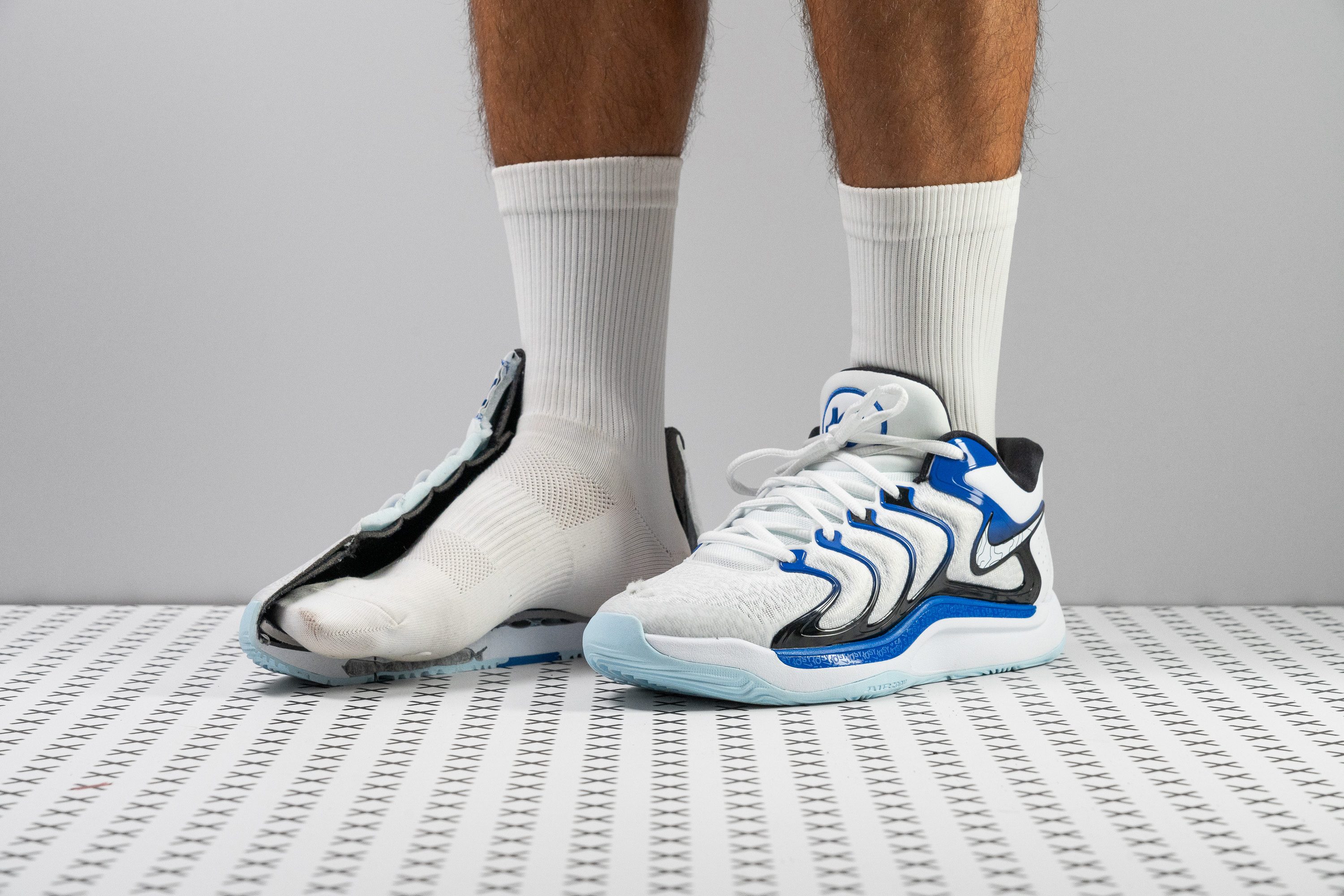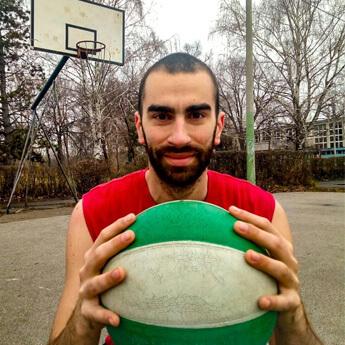Our verdict
- Top pick in best Nike basketball shoes (2024)
- Top pick in best low top Nike basketball shoes (2024)
Pros
- Wonderful support and foot containment
- Cushioned heel and snappy forefoot
- Very padded and comfortable
- Strong and consistent grip on every surface
- Way more breathable than average
- Okay to play streetball from time to time
- Nice court feel
- Toe-drag protection
Cons
- Not for wide feet
- Upper could be more durable
- Opening might be too wide
Audience verdict
Comparison
The most similar basketball shoes compared
+ + Add a shoe | |||||
|---|---|---|---|---|---|
| Audience score | 88 Great! | 87 Great! | 92 Superb! | 90 Great! | |
| Price | $150 | $140 | $120 | $155 | |
| Signature | Kevin Durant | Devin Booker | Ja Morant | Kevin Durant | |
| Shock absorption | High | Moderate | Low | High | |
| Energy return | High | Low | Moderate | High | |
| Traction | Moderate | Moderate | Moderate | High | |
| Top | Low | Low | Low | Low | |
| Ankle support | ✓ | ✓ | ✓ | ✓ | |
| Weight lab | 13.8 oz / 390g | 13.6 oz / 386g | 11.9 oz / 336g | 14.9 oz / 422g | |
| Lightweight | ✓ | ✓ | ✓ | ✗ | |
| Breathability | Breathable | Warm | Breathable | Breathable | |
| Outsole durability | Good | Decent | Decent | Decent | |
| Drop lab | 5.6 mm | 7.0 mm | 3.9 mm | 4.8 mm | |
| Heel stack lab | 26.1 mm | 26.9 mm | 26.1 mm | 26.7 mm | |
| Forefoot | 20.5 mm | 19.9 mm | 22.2 mm | 21.9 mm | |
| Size | True to size | Slightly small | Slightly small | True to size | |
| Midsole softness | Balanced | Balanced | Firm | Balanced | |
| Stiffness | Moderate | Moderate | Moderate | Moderate | |
| Torsional rigidity | Moderate | Stiff | Moderate | Moderate | |
| Heel counter stiffness | Moderate | Stiff | Moderate | Moderate | |
| Width / fit | Medium | Medium | Narrow | Medium | |
| Toebox width | Narrow | Medium | Medium | Medium | |
| Midsole width - forefoot | Average | Average | Narrow | Average | |
| Midsole width - heel | Average | Narrow | Average | Average | |
| Heel padding durability | Decent | Good | Decent | Good | |
| Toebox durability | Decent | Decent | Decent | Decent | |
| Insole thickness | Average | Average | Average | Average | |
| Outsole hardness | Hard | Average | Average | - | |
| Outsole thickness | Average | Average | Average | Average | |
| Heel tab | None | Finger loop | None | None | |
| Ranking | #37 Top 43% | #29 Bottom 46% | #3 Top 6% | #9 Top 17% | |
| Popularity | #31 Top 36% | #12 Top 23% | #8 Top 15% | #9 Top 17% |
Who should buy
Kevin Durant is ready to give us not only wonderful basketball, but also pretty cool shoes if you're looking for:
- A hooper with wonderful support and foot containment to go for risky moves.
- Wonderful grip no matter the court, biting even dusty ones.
- A model with lateral stability details (TPU piece) in a flexible structure.
- A comfortable and breathable pal to play when it's hot (even streetball from time to time).
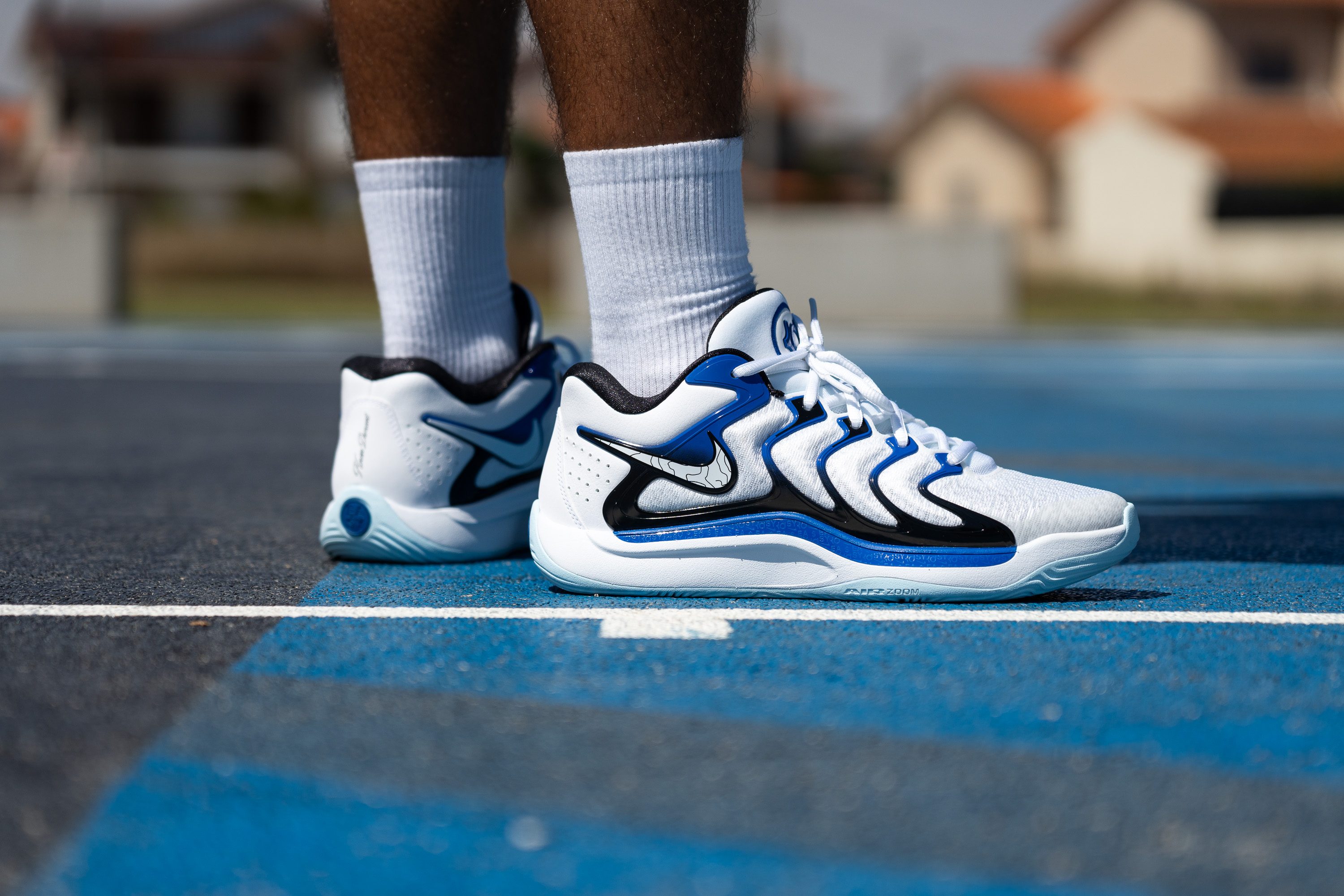
Who should NOT buy
When we put on this shoe during our wear tests, we felt its opening was pretty wide. This could've been solved with an extra eyelet, as we really don't recommend sizing up. Why? Well, because that would just make the opening wider, and the shoe itself might lose some of its wonderful support and stability. If you're looking for a hooper with great ankle support (and other stability features), we believe you should have a look at the most supportive pairs in our catalog.
If you have really wide feet, the KD 17 won't do. Also, as we've explained before, sizing up is not recommendable in this shoe (at least in our opinion). Instead, we believe you should have a look at basketball shoes with a more spacious toebox like the New Balance TWO WXY V5 which is also available in wide options.
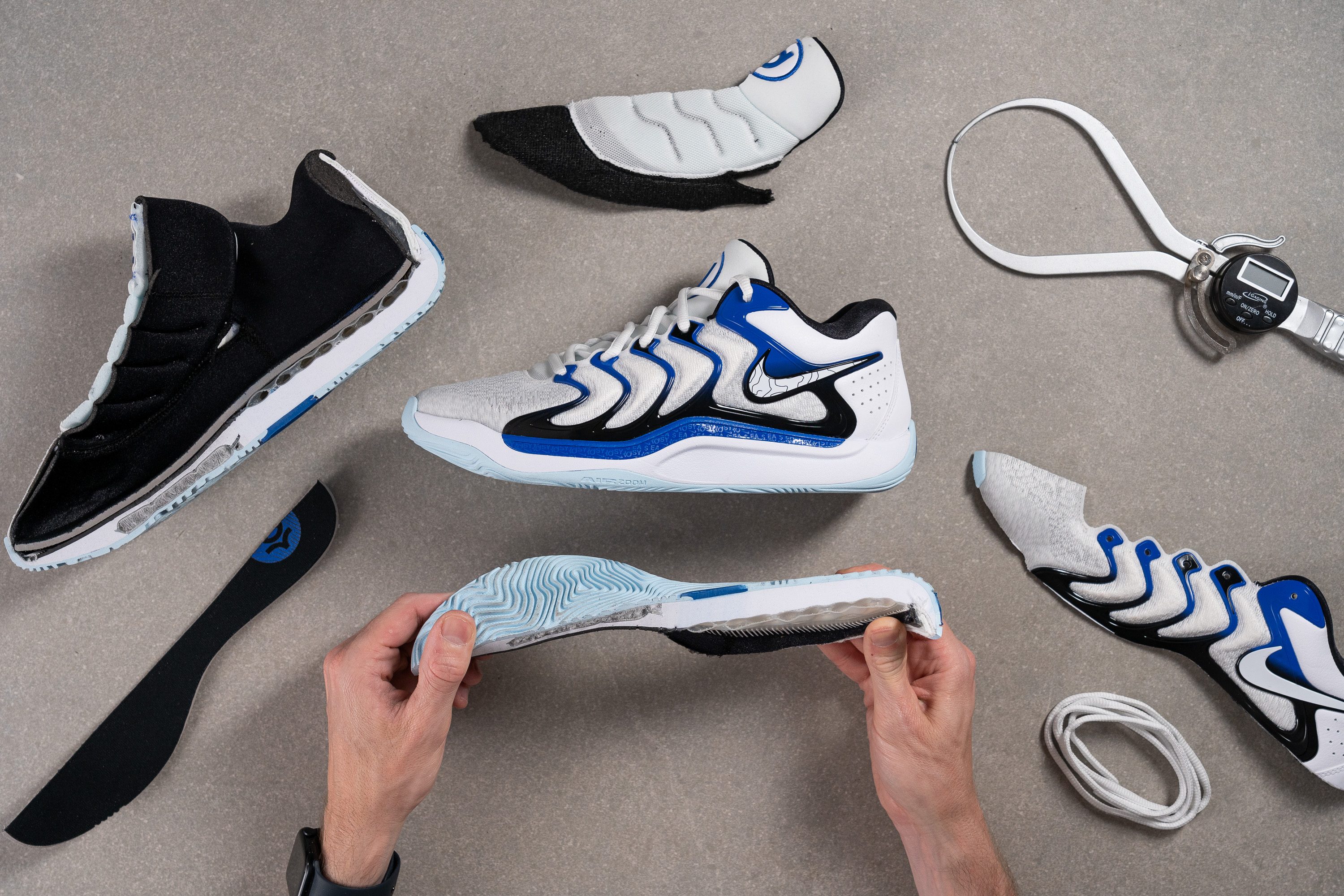
Cushioning
Shock absorption
We are amazed at how the KD 17 manages to provide above-average shock absorption while being a low-stack and grounded shoe!
The answer lies in its use of a top-loaded Air Strobel and a bottom-loaded Zoom Air unit in the midsole. Both dampen the impact of hard landings, keeping the ride comfortable and the joints protected.
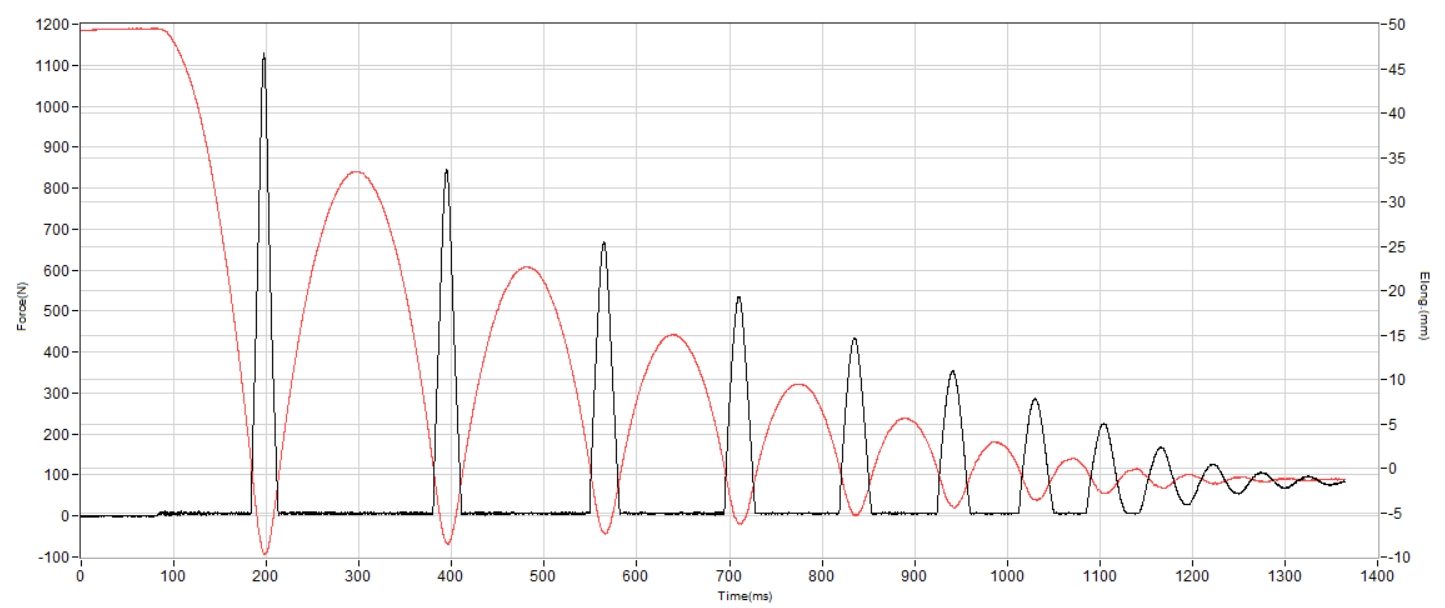
| KD 17 | 108 SA |
| Average | 103 SA |
Energy return
Because of the Zoom Air placement, most of the KD 17's propulsion is concentrated in its forefoot. It showed some of the highest energy return measurements of 70.7% in this area, enhancing speed and explosiveness for take-offs, rebounds, and blocks.
The shoe's lively forefoot balances out its otherwise grounded and muted profile. The KD 17 can feel dull in the heel with a below-average rebound of 53.7%.
| KD 17 | 70.7% |
| Average | 62.1% |
Heel stack
At 26.1 mm, the KD 17's heel stack is lower than average.
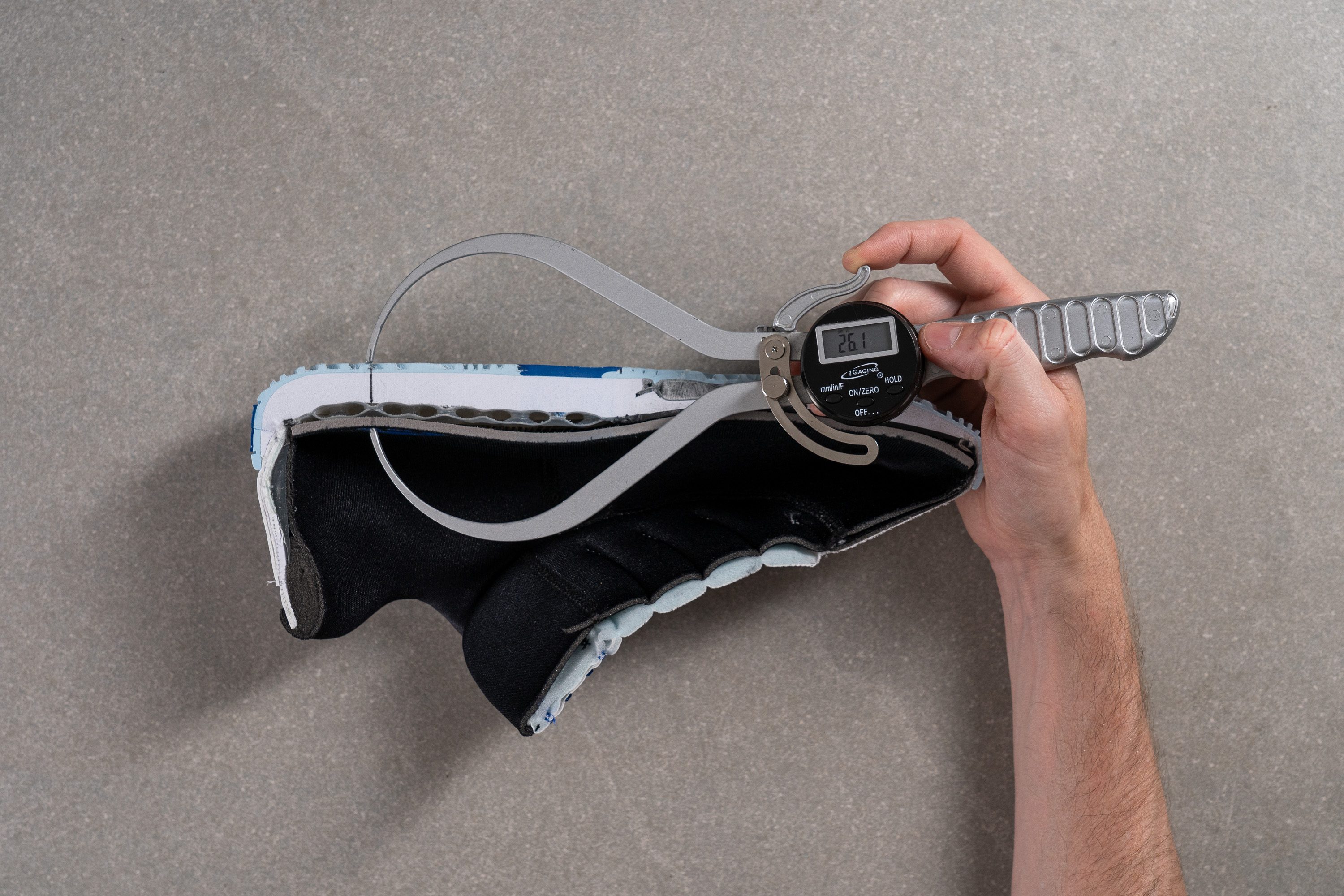
The KD 17's low profile made us feel the court closer to our feet, which translated into more controlled and stable moves. When you're a quick player, this comes in really handy, as you're able to perform more complicated steps or dribbles more easily. Trust us, we verified it in our wear tests!
| KD 17 | 26.1 mm |
| Average | 28.8 mm |
Forefoot stack
The forefoot stack follows the same path. At 20.5 mm, it's lower than average according to our caliper, yet includes one of Nike's coolest technologies.
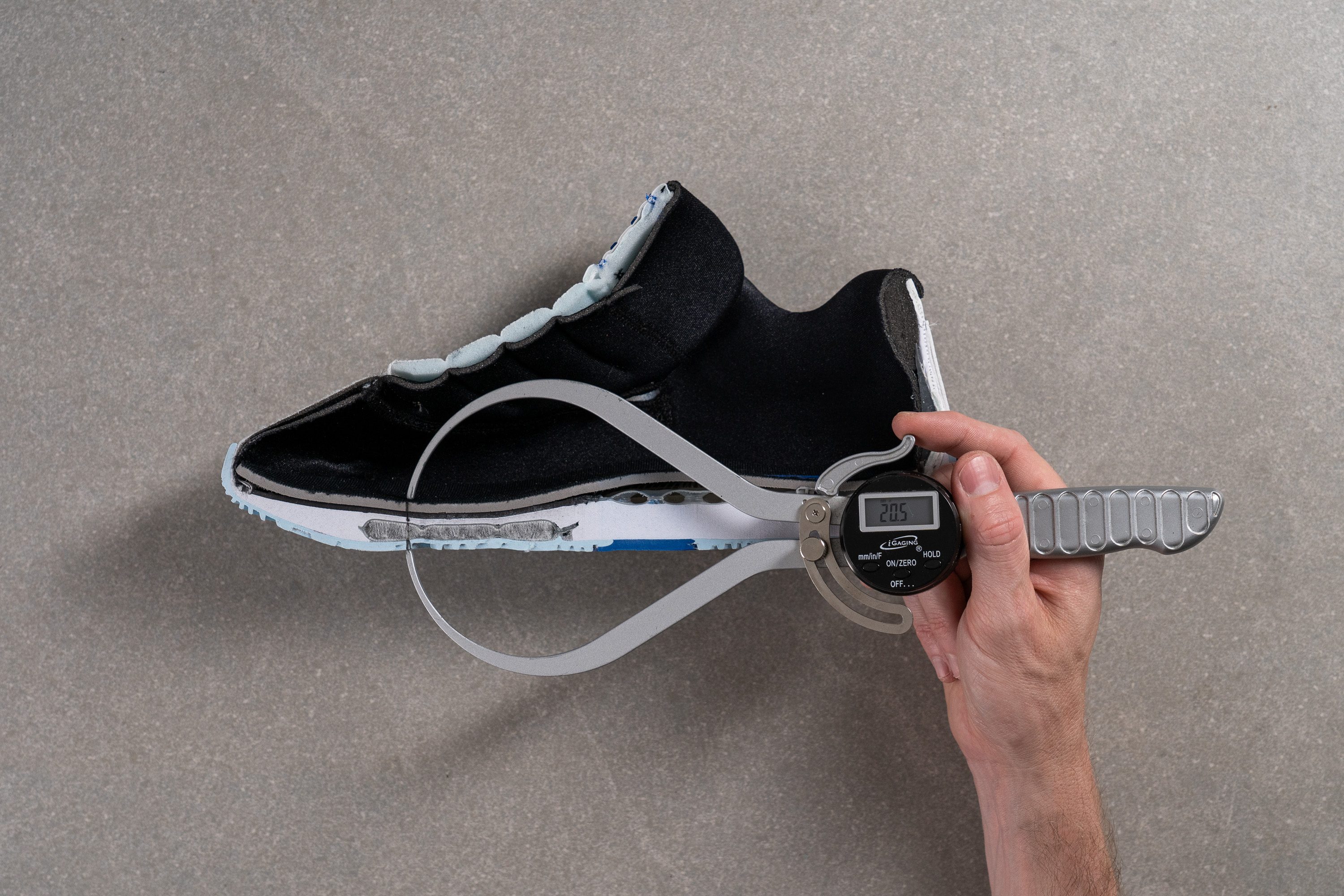
| KD 17 | 20.5 mm |
| Average | 21.4 mm |
Drop
At 5.6 mm, this shoe's drop is among the average. This means there's not a big difference between the forefoot and heel heights.
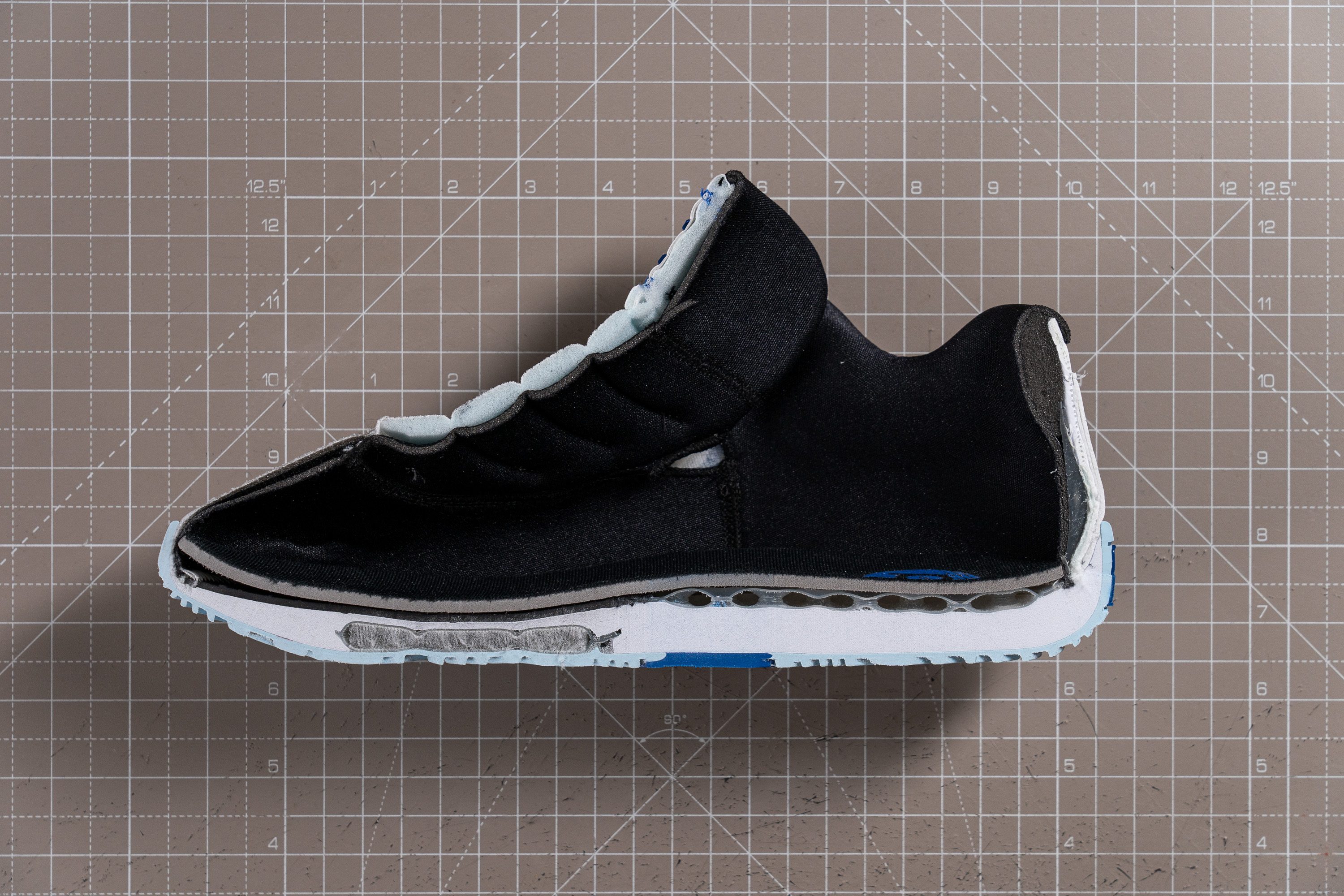
| KD 17 | 5.6 mm |
| Average | 7.4 mm |
Midsole softness
During our wear tests, we felt a big difference between the KD 17 and the 16. Both models are really comfortable, that's for sure, yet this new iteration felt way softer on foot.
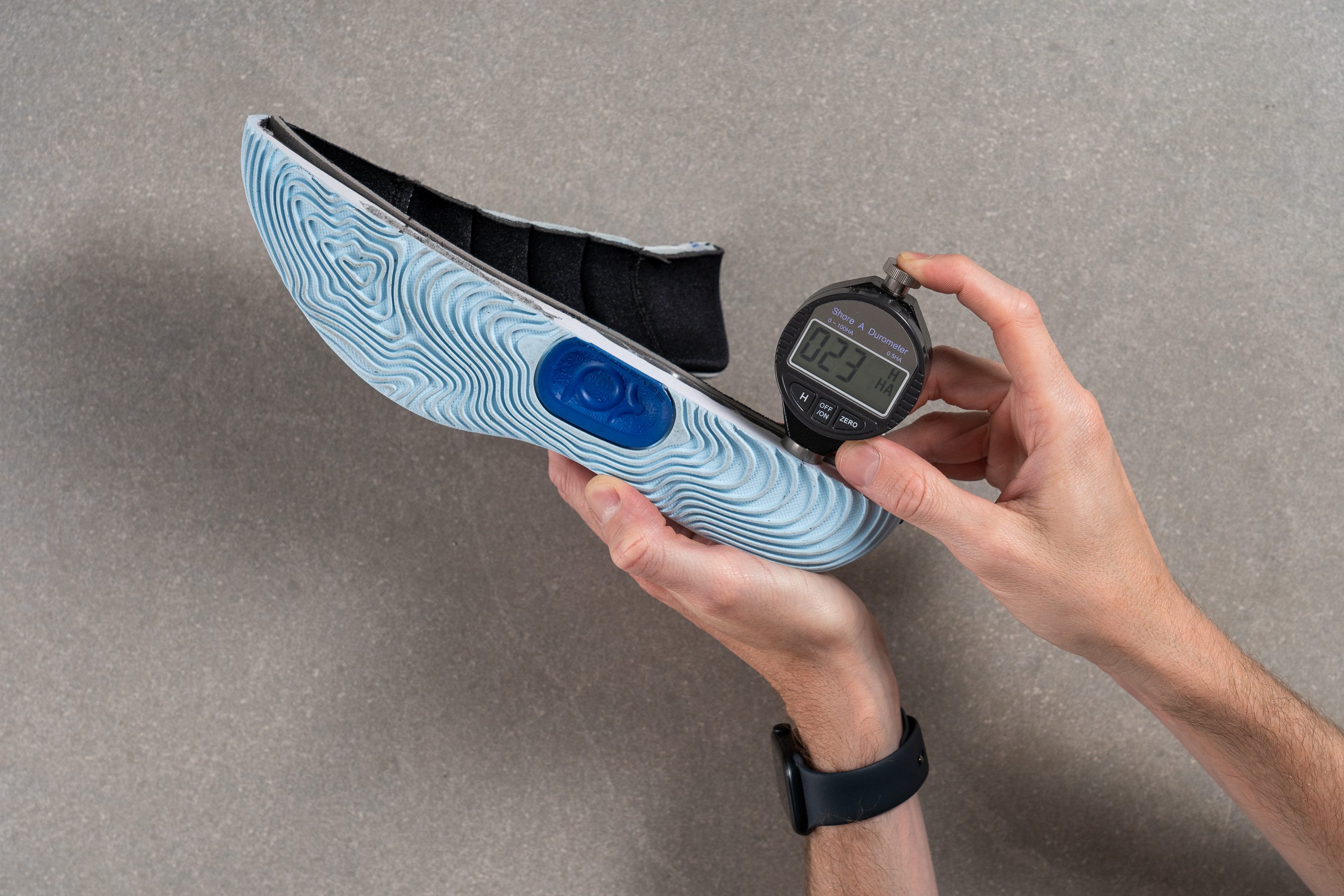
At 23.1 HA, it's even softer than average. And our feet noticed that! This shoe felt just right, and we really liked the mix between the plush midsole and the stability features (such as the midfoot shank).
We never felt that this pair's base was too much, or way too plush for us to be stable. We can summarise our experience during the wear tests with just one sentence: the KD 17 gave us the best of both worlds!
| KD 17 | 23.1 HA |
| Average | 24.3 HA |
Size and fit
Size
Nike KD 17 fits true to size (118 votes).
Internal length
| KD 17 | 275.6 mm |
| Average | 271.7 mm |
Width / Fit
The KD 17 offers a less spacious, more one-to-one fit in a D medium width.
Having created a gel mold of its interiors, we measured the widest part of the shoe at 91.1 mm. Only a tad narrower than average but still within the average range.
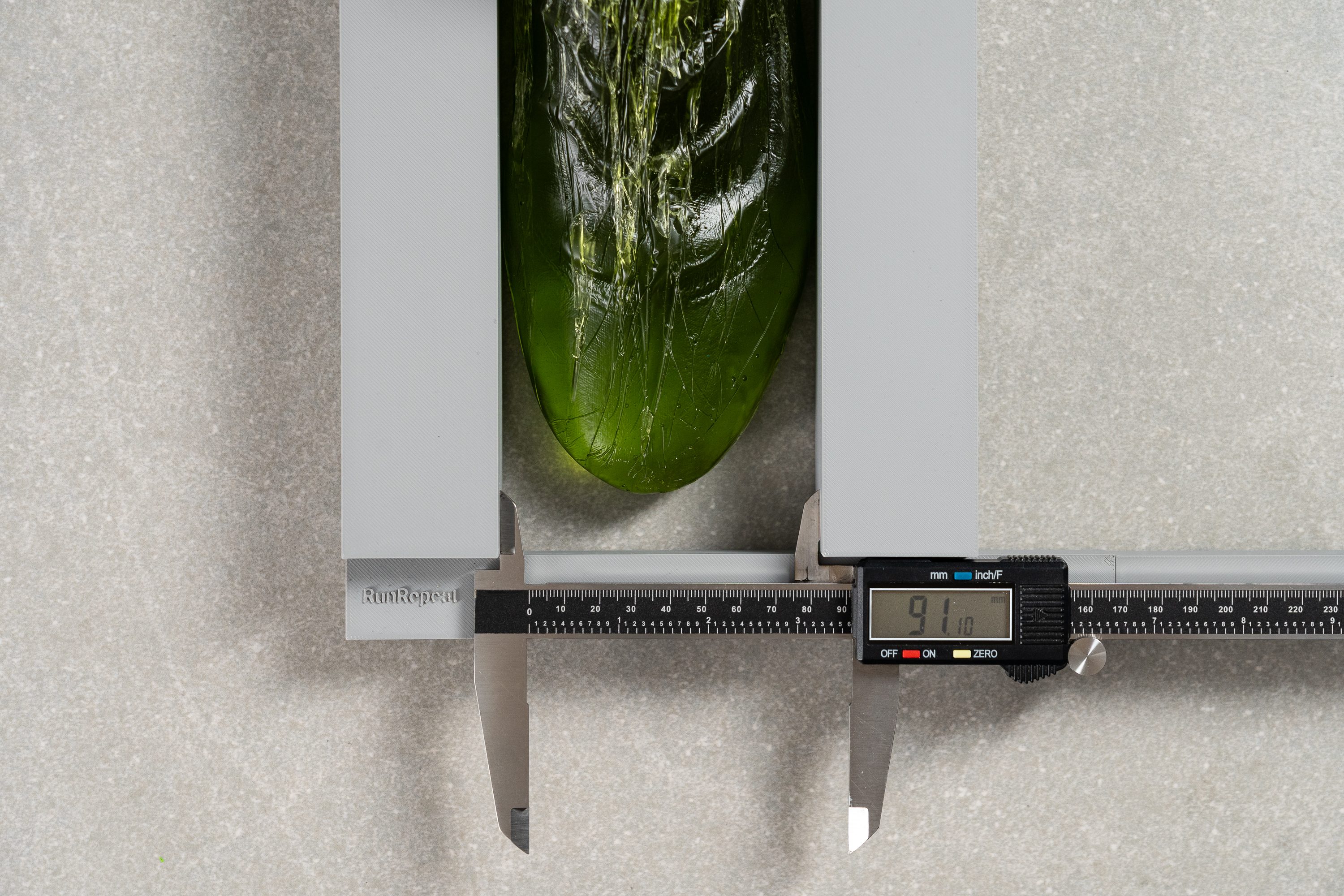
| KD 17 | 91.1 mm |
| Average | 92.8 mm |
Toebox width
The difference becomes apparent in the tip of the shoe's toebox where it gets notably narrower than the average basketball shoe. This taper angle reflected in a below-average width of 65.3 mm near the big toe.
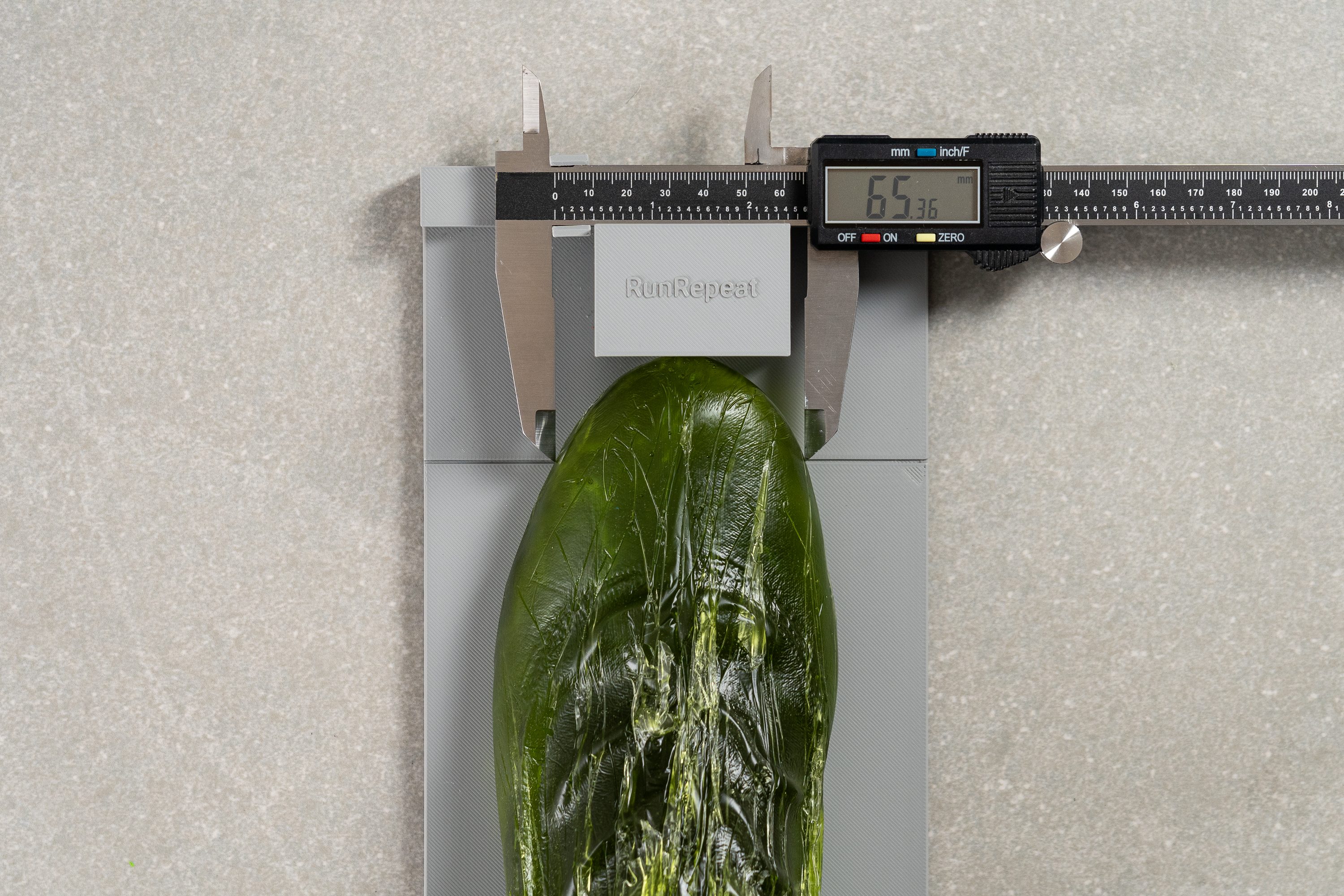
| KD 17 | 65.3 mm |
| Average | 69.3 mm |
Toebox height
Gladly, the shoe's toebox height came out as expected at 23.5 mm. There is an ample amount of vertical space in this Nike shoe.
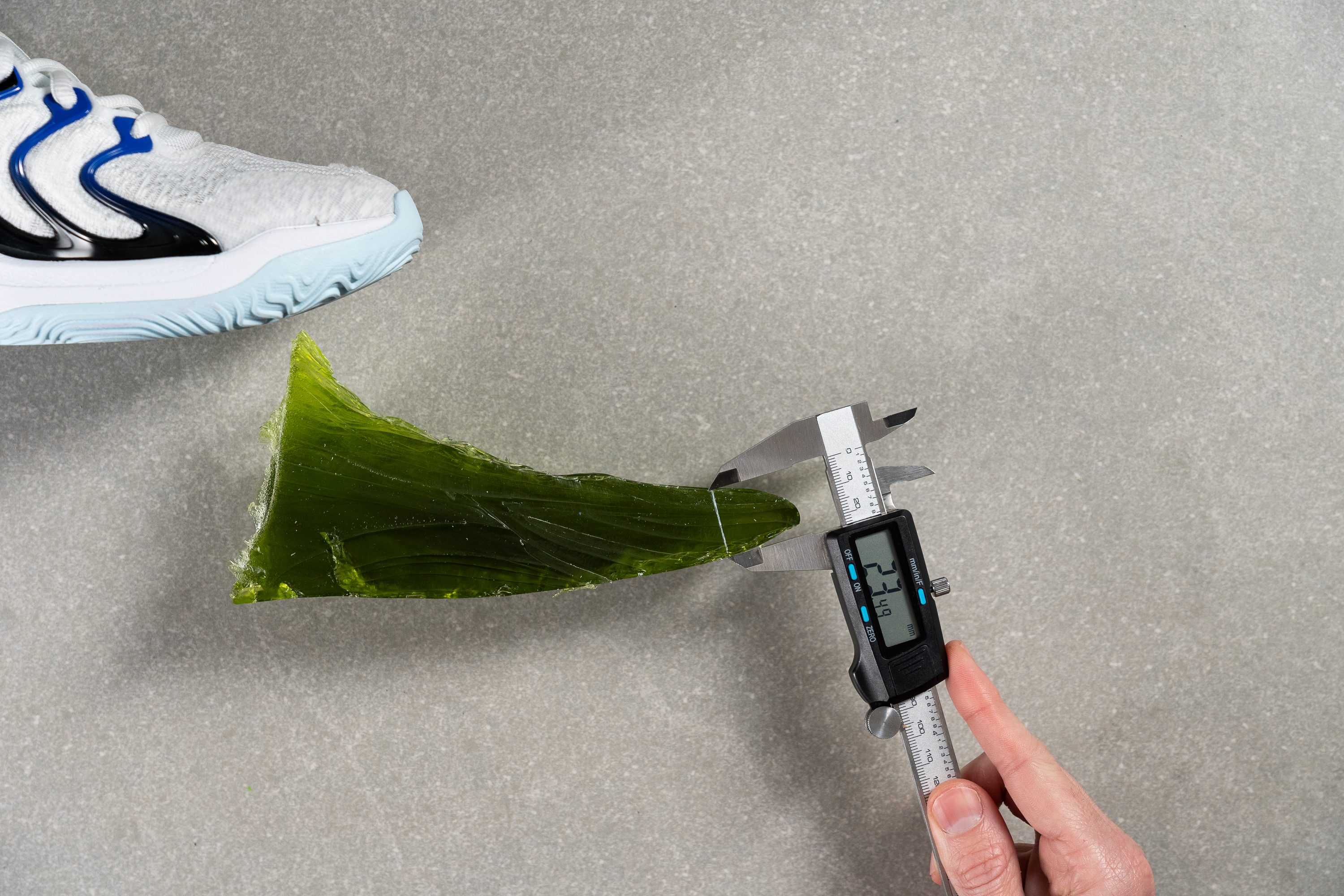
| KD 17 | 23.5 mm |
| Average | 23.5 mm |
Traction / Grip
Forefoot traction
The KD 17 offers a consistent and adaptable grip on hardwood which was reflected in a relatively high friction score of 0.74 in our grip test. This Nike shoe has great stopping power, supporting quick cuts and direction changes.
| KD 17 | 0.74 |
| Average | 0.75 |
Outsole design
The shoe features a wavy tread pattern with thick and sturdy treadlines that latch onto both indoor and outdoor courts very well.
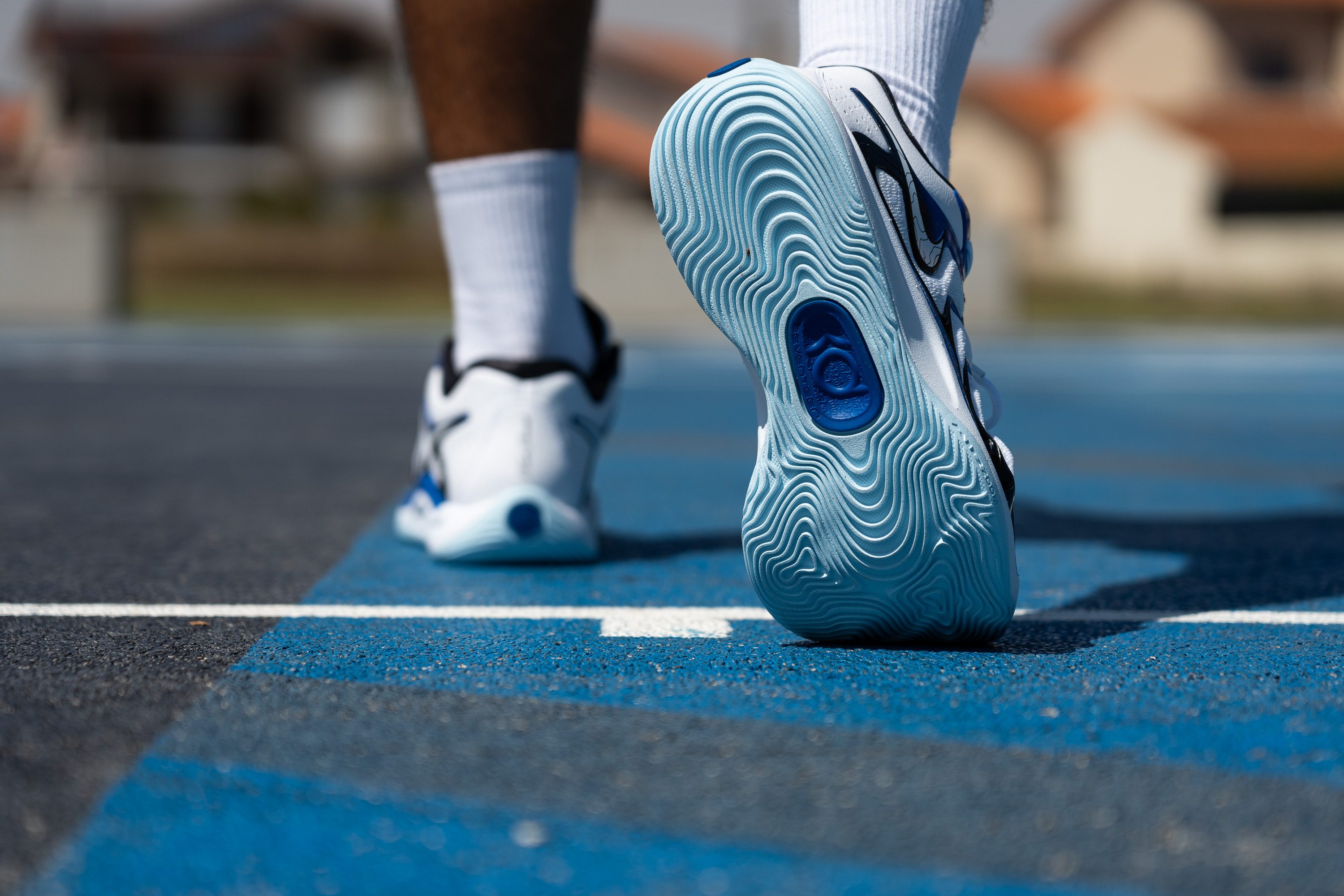
Flexibility / Stiffness
The KD 17 proved to be a bit more forgiving in the forefoot compared to its predecessor.
Using a shoe flexing tester, we found that this Nike silhouette requires 20.3N to bend to a 30-degree angle which a standard amount of force for a hoop shoe. On foot, this score translated into quick and smooth toe-offs which acommodated our pump fakes beautifully.
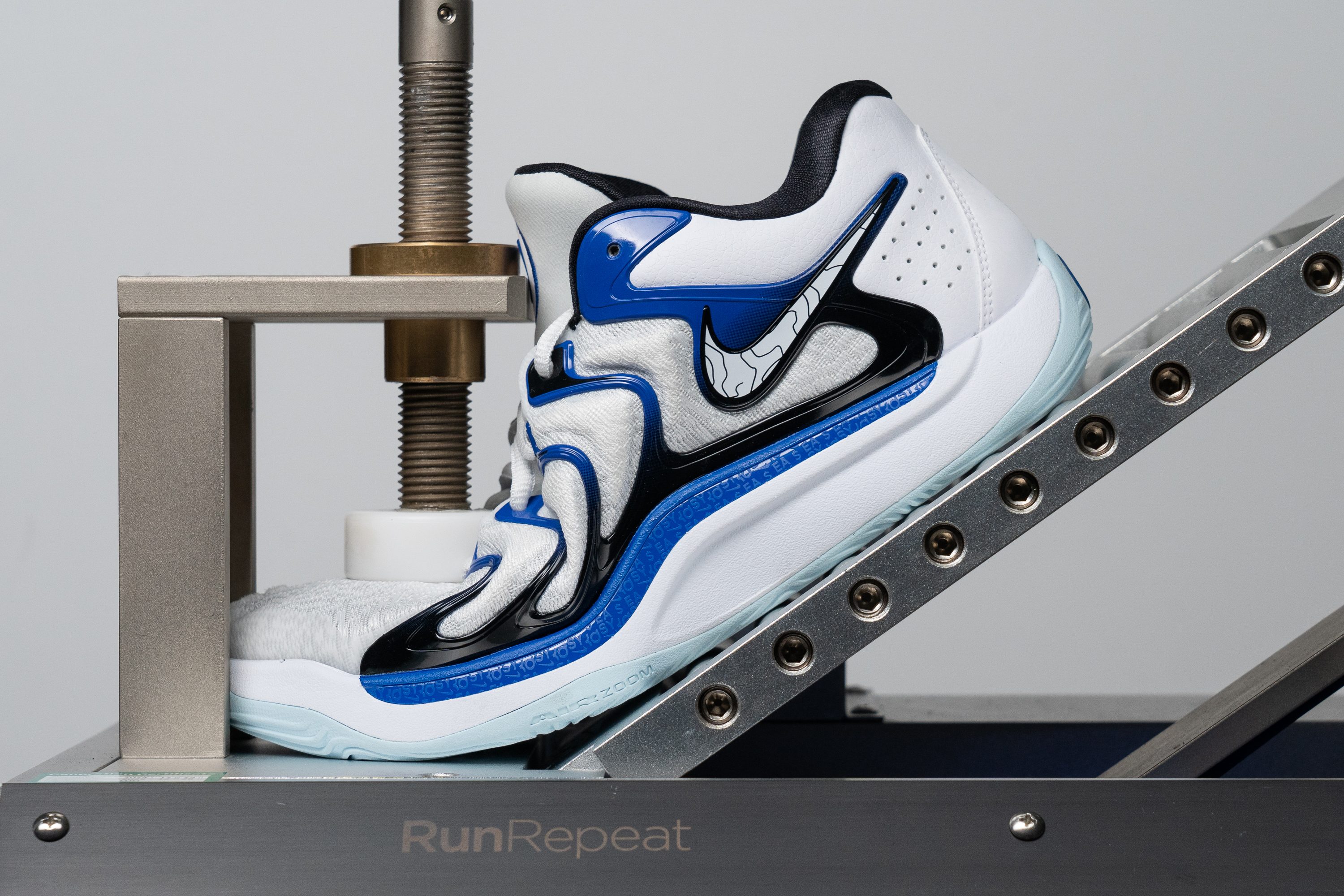
| KD 17 | 20.3N |
| Average | 20.5N |
Weight
During our wear tests playing games with this shoe, we didn't feel it was dragging our feet down or anything like that. But we didn't feel fast either!
We took it to the lab and put it on our scale. Honestly, we had quite high hopes, as the Nike KD was becoming lighter throughout the iterations. The 15's were 14.04 oz/398g, the 16's 13.9 oz/394.0g... and the 17's? 13.8 oz/390.0g! Yeah, these are small steps, but this Nike didn't stop taking them!
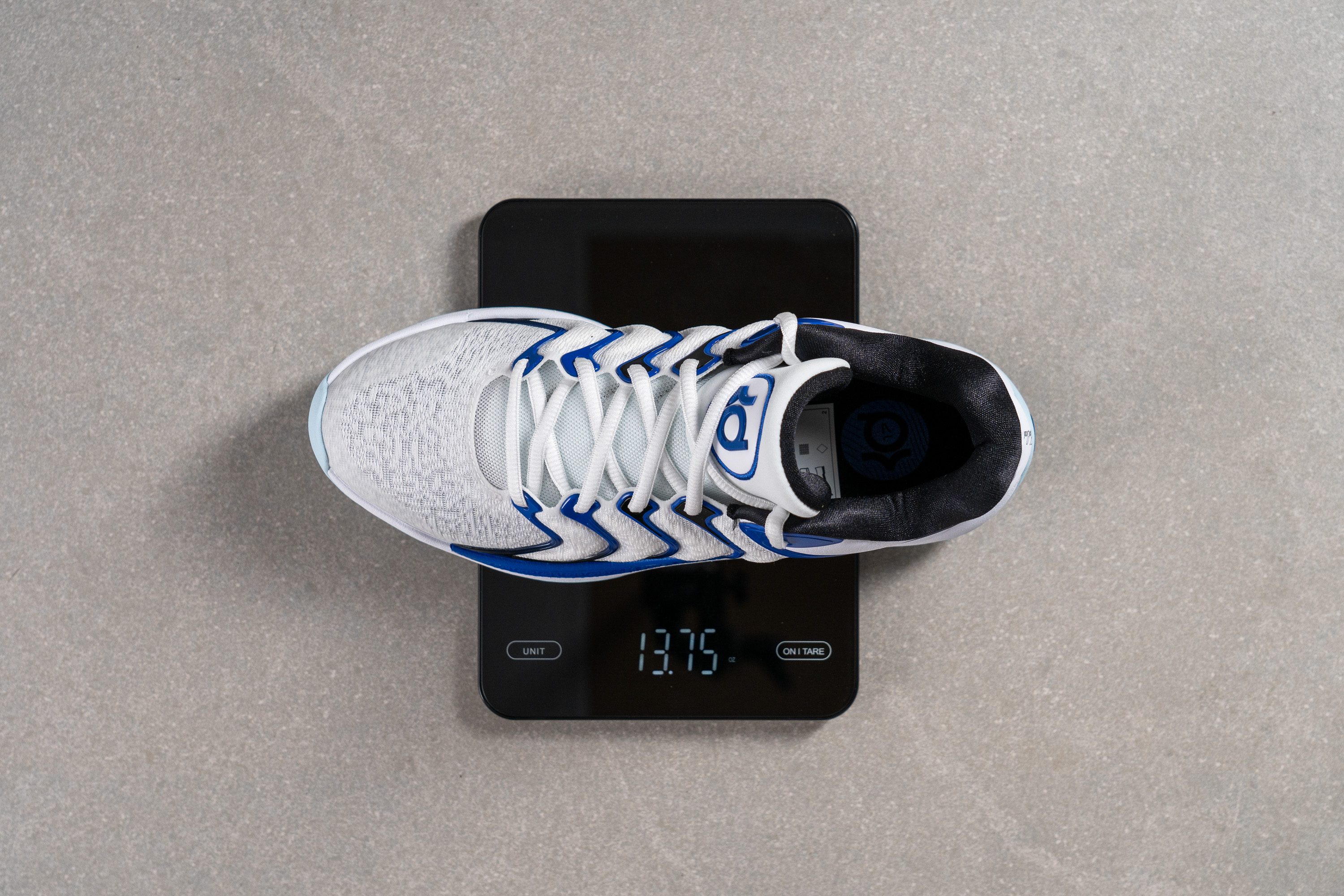
Our scale returned 13.75 oz/389.8 g when we measured the left shoe.
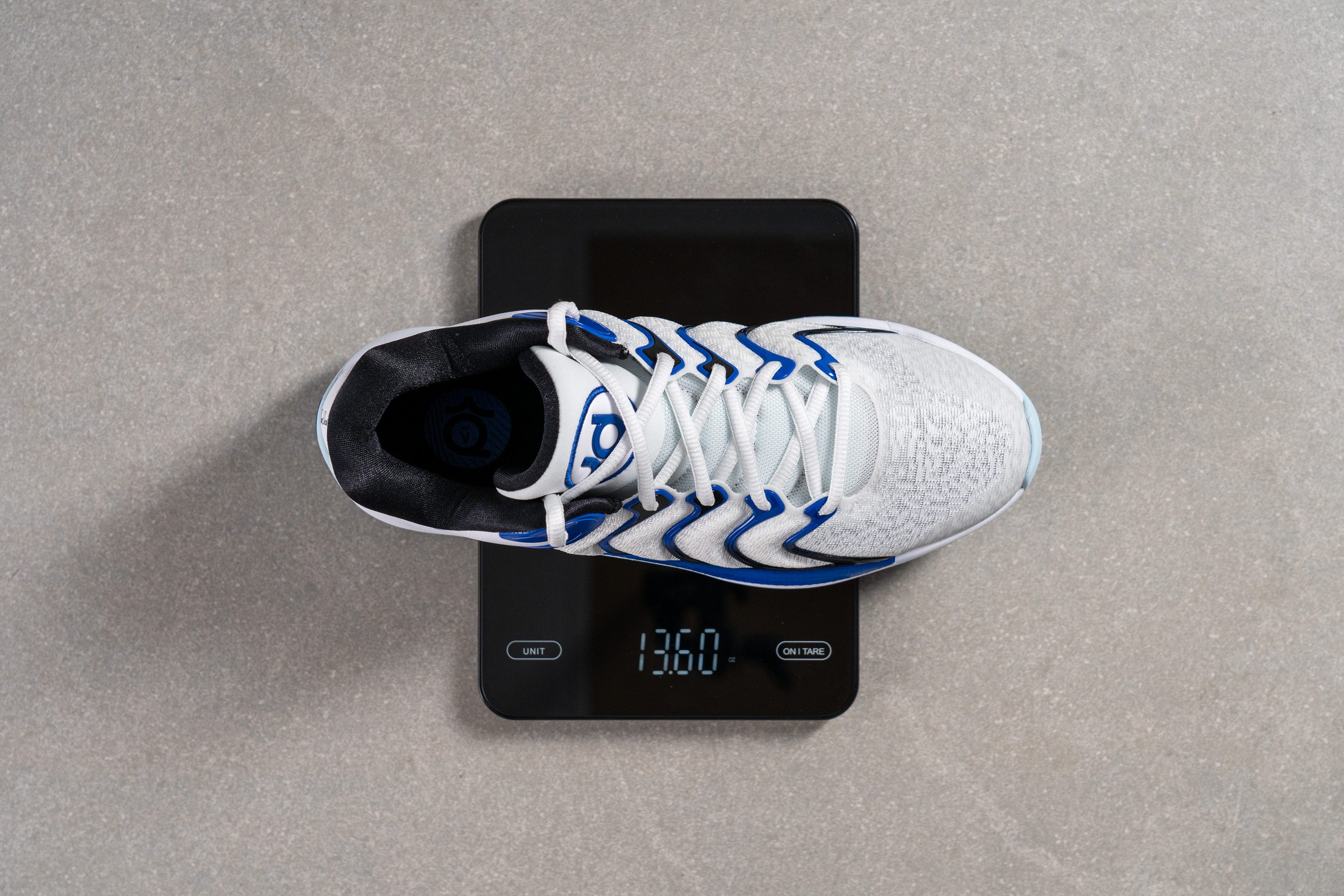
And a little bit less, 13.6 oz/385.5 g, when we checked the right shoe's weight!
Honestly, we can't complain. Even if it's not by a lot, Nike keeps working hard to reduce the KD's overall weight; and we want to appreciate that! We definitely hope the brand keeps it up for future iterations.
| KD 17 | 13.8 oz (390g) |
| Average | 13.8 oz (391g) |
Breathability
The KD 17 is already showing us how much of an improvement it is right in our very first test. We grabbed our smoke machine and started to pump up some smoke into the shoe.
Look at how incredibly well-ventilated the toebox is! It gets even more evident when we compare it with the Reebok Shaq Attaq (1/5), which struggled a lot to let our feet breathe.
But when we put the KD 17 right in front of our light, we didn't see any ventilation holes. So, how come it actually let all that smoke out? We were pretty curious, so we grabbed our microscope and checked what was going on with the upper material.
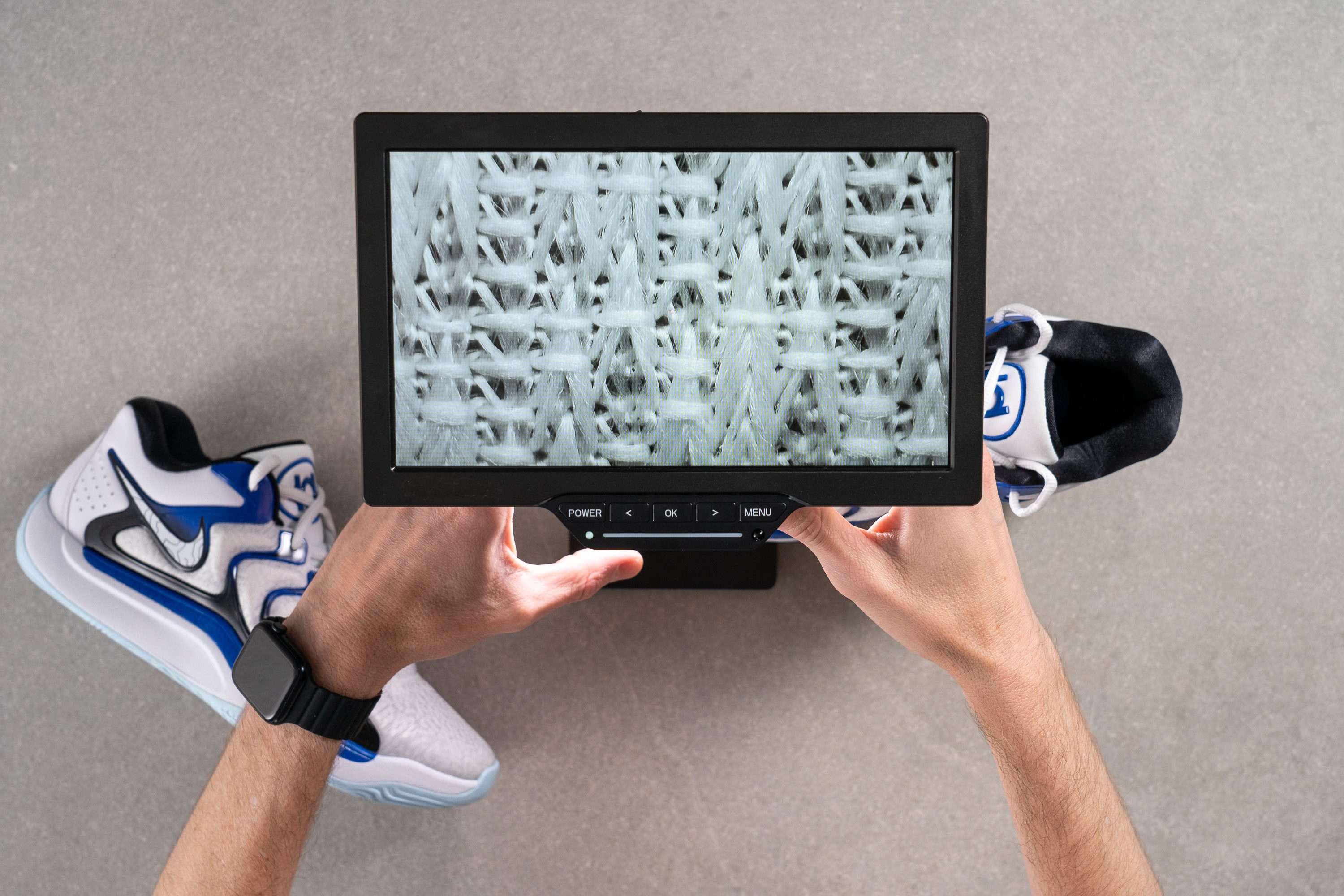
Look at that! Its woven mesh upper has multiple layers with many gaps. We can clearly see Nike focused on breathability after the warm KD 16 (scored a 1/5 in this test), but the brand also made sure durability was a priority. That's why our light didn't actually go through the upper despite its ventilation holes: there are just many layers!
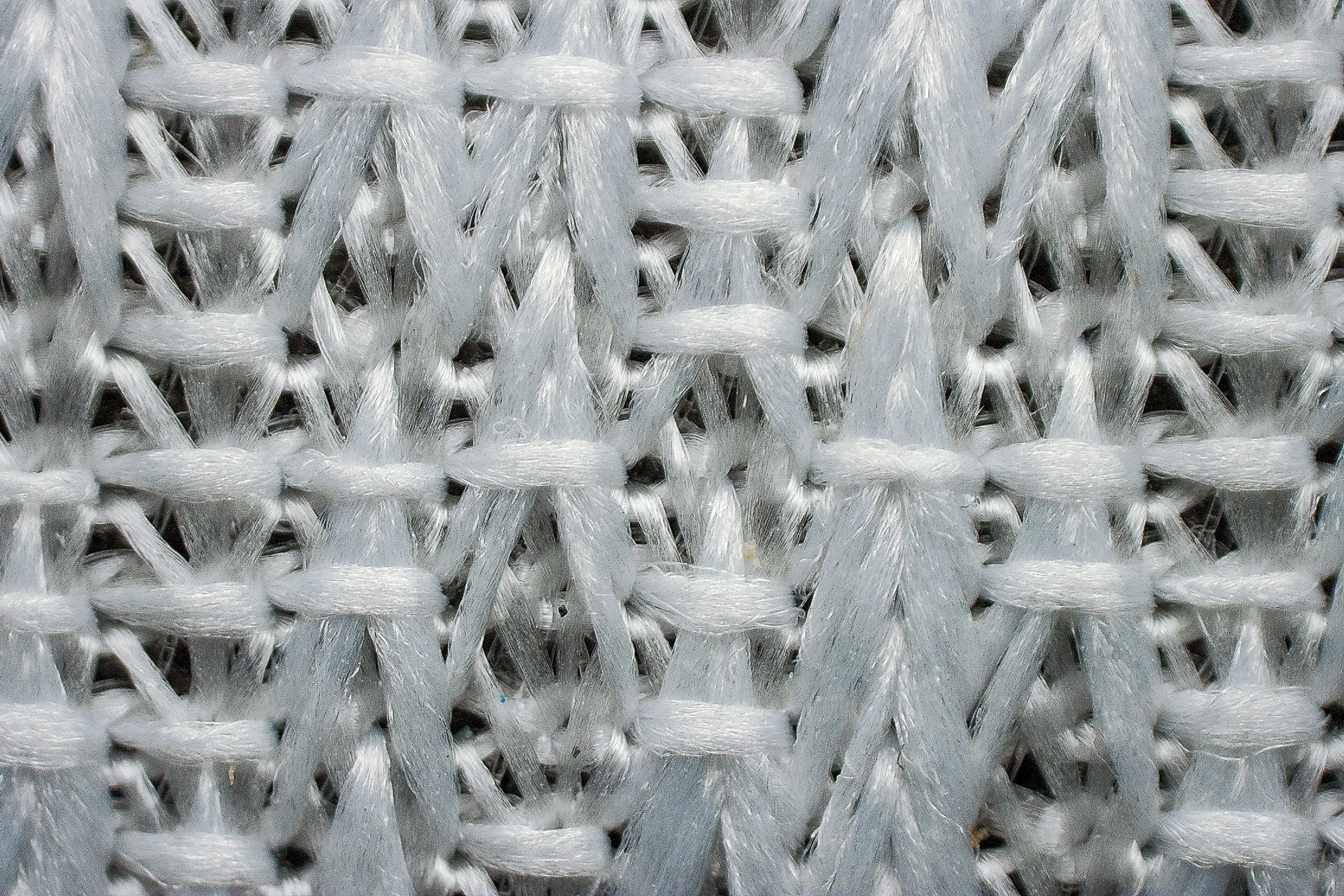
We decided to give the KD 17 a fantastic 4/5 on our breathability test. This isn't only a great score overall, but also a wonderful improvement regarding the previous iteration. And our feet loved it!
| KD 17 | 4 |
| Average | 2.5 |
Stability
Lateral stability test
There's a feature that basketball shoes don't play around with: stability!
You know, you can prefer a more or less padded model; one that lets you feel the court underfoot or one that is extra cushioned to ensure impact protection; or one with a low-top or high-top structure. Those are all different possibilities that depend on your playstyle, position, and taste. Nevertheless, each and every basketball shoe needs to be stable.
We can see it clearly in the video: the Nike 17 makes sure our heels don't overextend themselves! We loved the contentment its overall padded structure offered us. And hey, talking about structure, have a look at this:
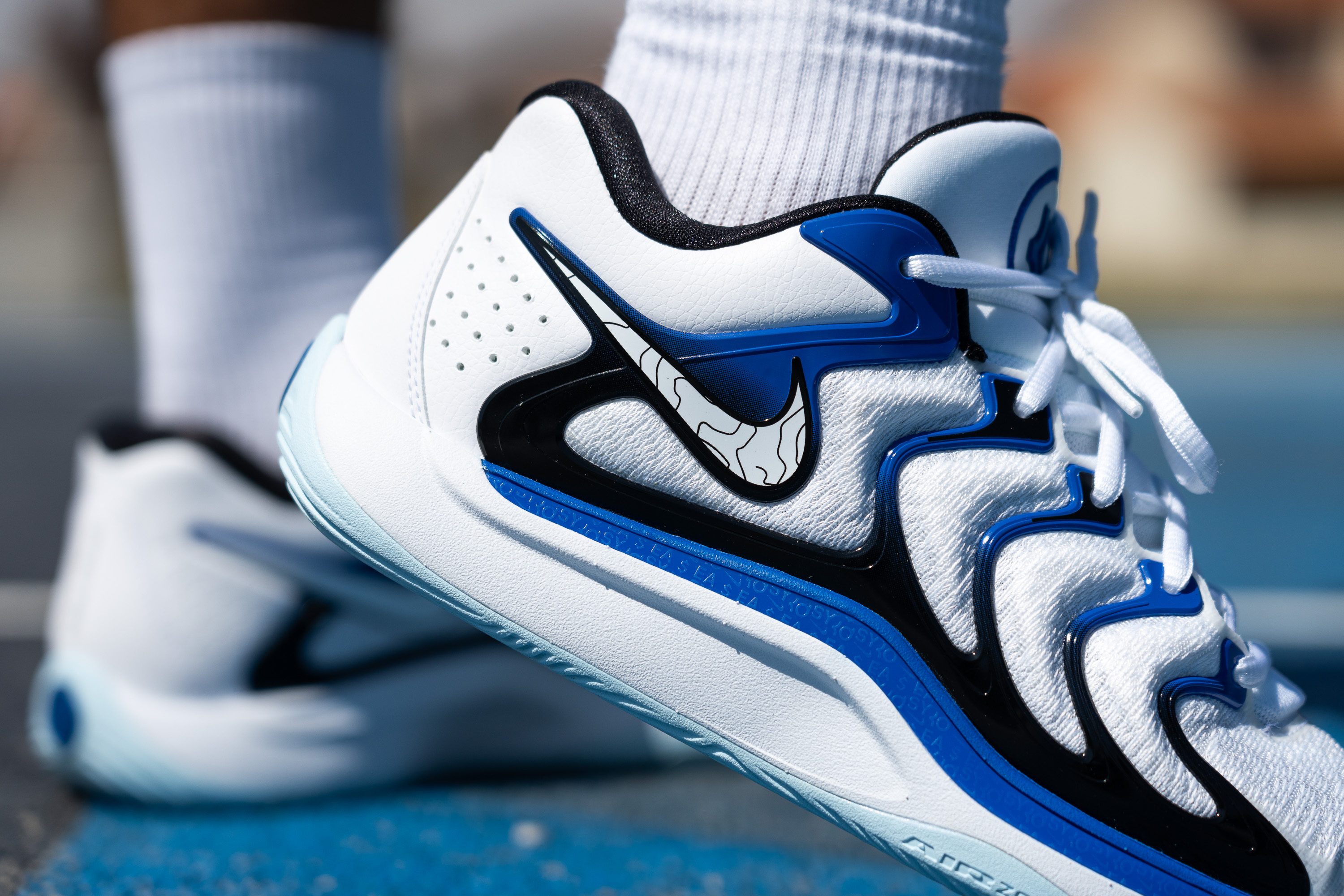
The KD 17's design is different from the one featured in older iterations. If you follow its midfoot plastic lines closely, you'll see all of them end in an eyelet. This worked as some kind of ribcage that embraced the shoe's upper, enveloping it in a nice hug that made our feet feel comfortable and safe during our playtests.
To test it even more, we performed some lateral movement drills to warm up before our games. This is a basic move in the sport, especially in defense. As you might already know, to shine as a defender you need to be quick, sharp, confident, and good at reading your opponent. Even though the KD 17 can't give you all of that, it will definitely offer you the support needed to be daring whilst feeling safe.
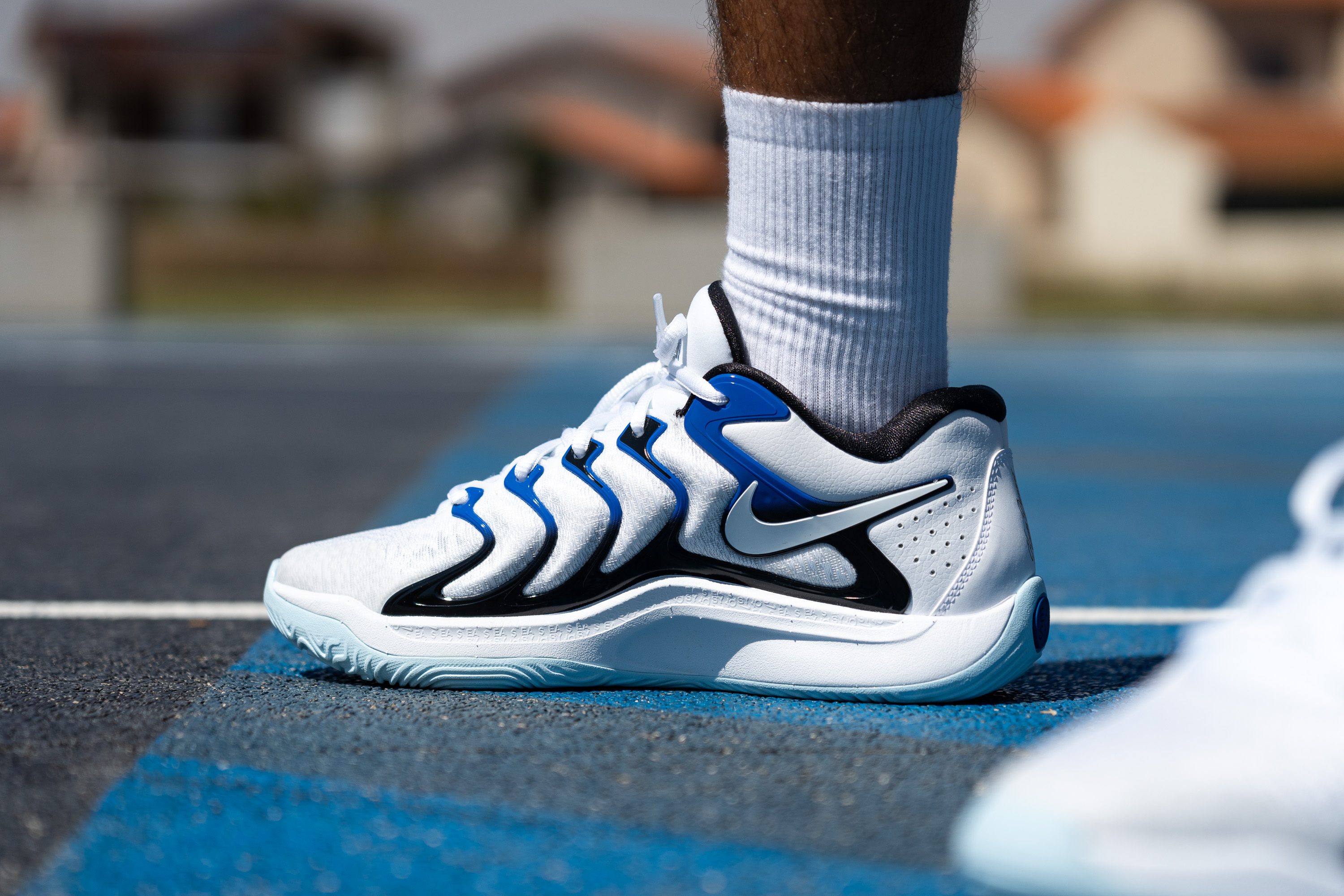
We really appreciated this, as it boosted our confidence when we played ball. When you feel your feet are right where they should be, there's nothing that can stop you!
Torsional rigidity
As we were saying, we really enjoyed this shoe's overall stability. That wonderful feeling of safety also came directly from the high torsional rigidity level of the KD 17.
Our fingers were struggling a lot to bend this shoe! Despite our efforts, we could only make it move a little bit, so we rightfully gave the KD 17 a 4/5 on our torsional rigidity test. Apart from the ribcage-like structure that hugs the upper, there's another key piece in this puzzle.
Can you see the TPU blue part right above the midsole with some letters and Swoosh on it? We've talked about it before, remember? Well, we believe that exact detail is the one preventing us from twisting the shoe more than necessary.
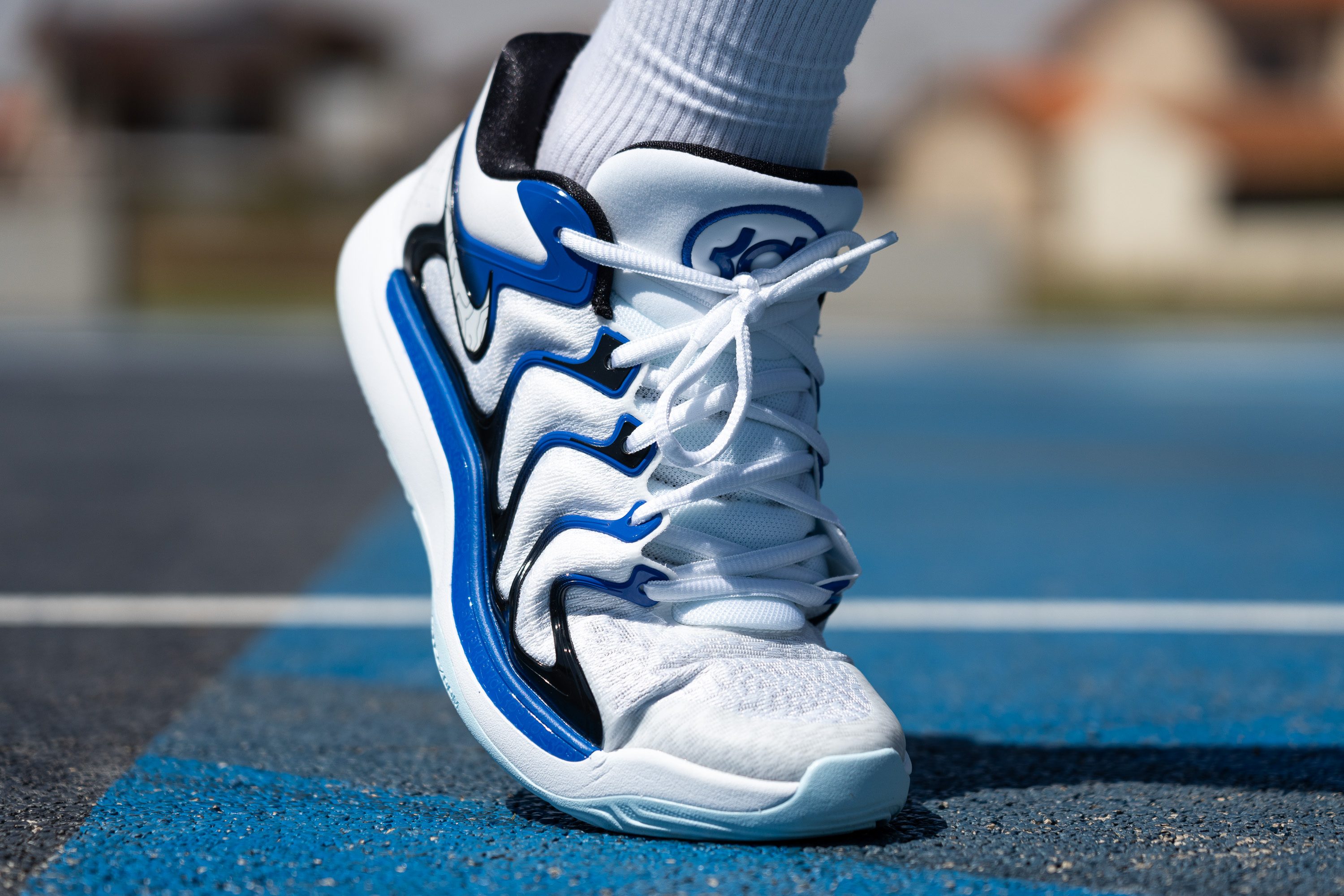
Another great touch from Nike!
| KD 17 | 4 |
| Average | 4.5 |
Heel counter stiffness
The extra padded heel counter of this shoe also showed great stability. Not only during our wear tests, where it didn't let our heel slip or go for any weird moves, but also in the lab. When we tried to bend it and push it, it barely gave in!
We really liked this, as it let us go all in when we played ball. You know, if you don't feel safe in your shoes, there's no way you'll go for risky plays!
| KD 17 | 4 |
| Average | 3.8 |
Midsole width - forefoot
The Nike KD 17's midsole width in the forefoot is average at 114.9 mm.
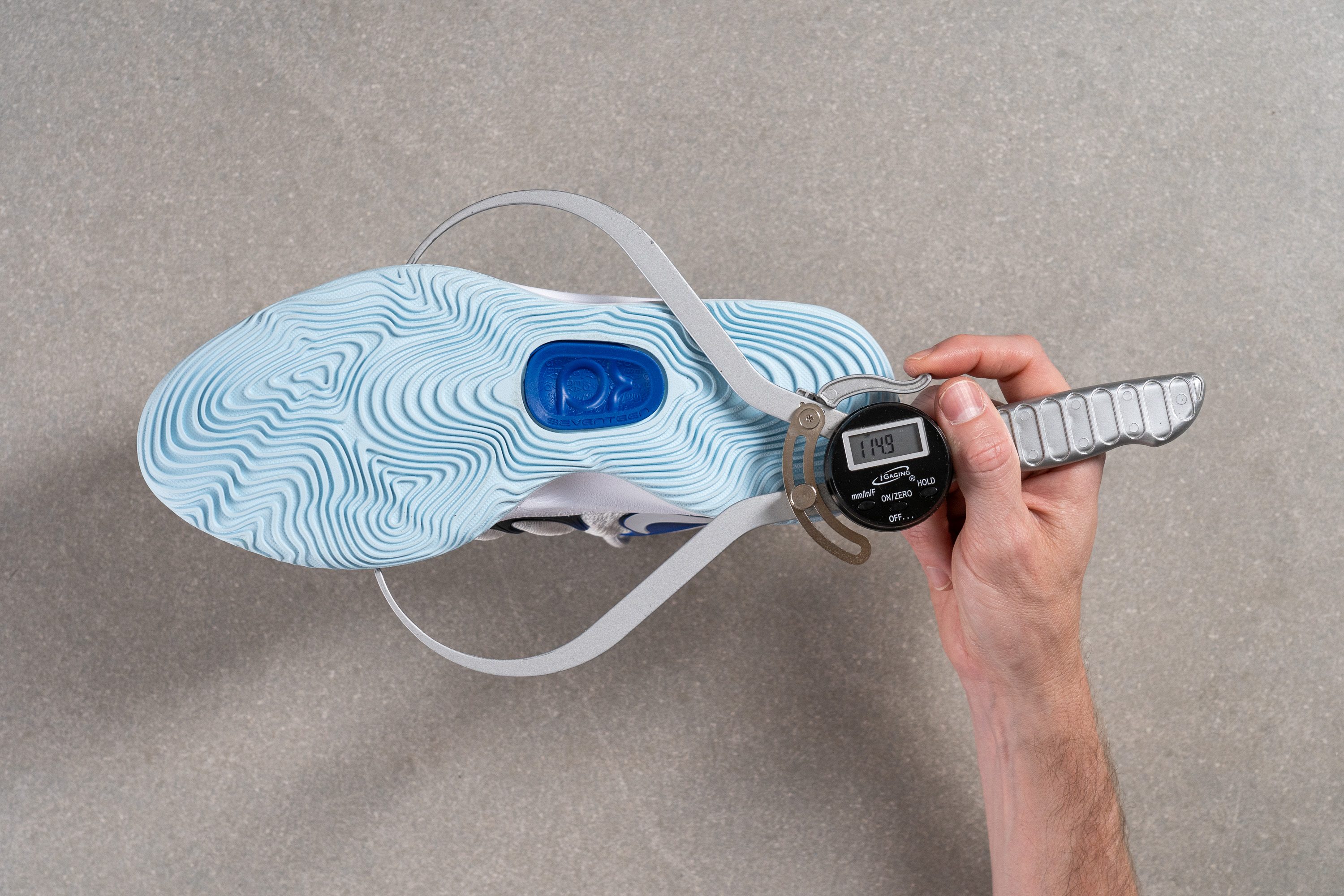
This gave us a solid base to land on, which we really appreciated! When we jumped from rebounds or went for layups, the fact that our feet could impact softly and safely on the ground (supported not only by this shoe's structure, but also by its technologies) made us want to keep playing.
| KD 17 | 114.9 mm |
| Average | 114.8 mm |
Midsole width - heel
The KD 17's midsole width in the heel is not as narrow as the KD 16's, but it's still narrower than average.
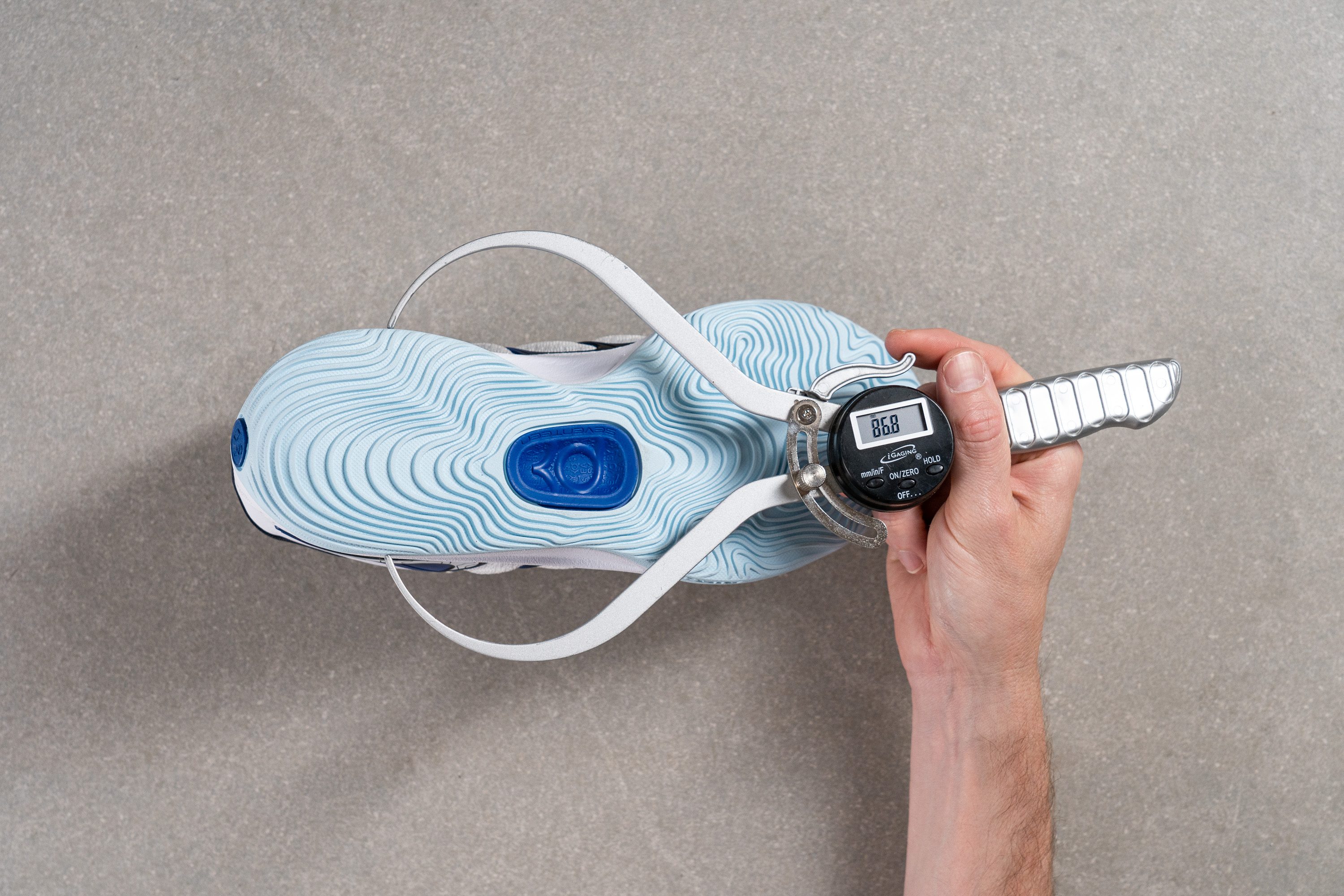
At 86.8 mm, this might mean that it might require a bit of a break-in for some people. Nevertheless, it fit our standard feet comfortably from the very first time we put it on.
| KD 17 | 86.8 mm |
| Average | 89.7 mm |
Durability
Toebox durability
After the wonderful breathability levels this Nike showed, we didn't expect it to be crazy durable. We did have some faith in its toebox, though, as some of the threads used seemed to be on the thicker side.
But... when we saw the white material flying around, we got ready for the worst.
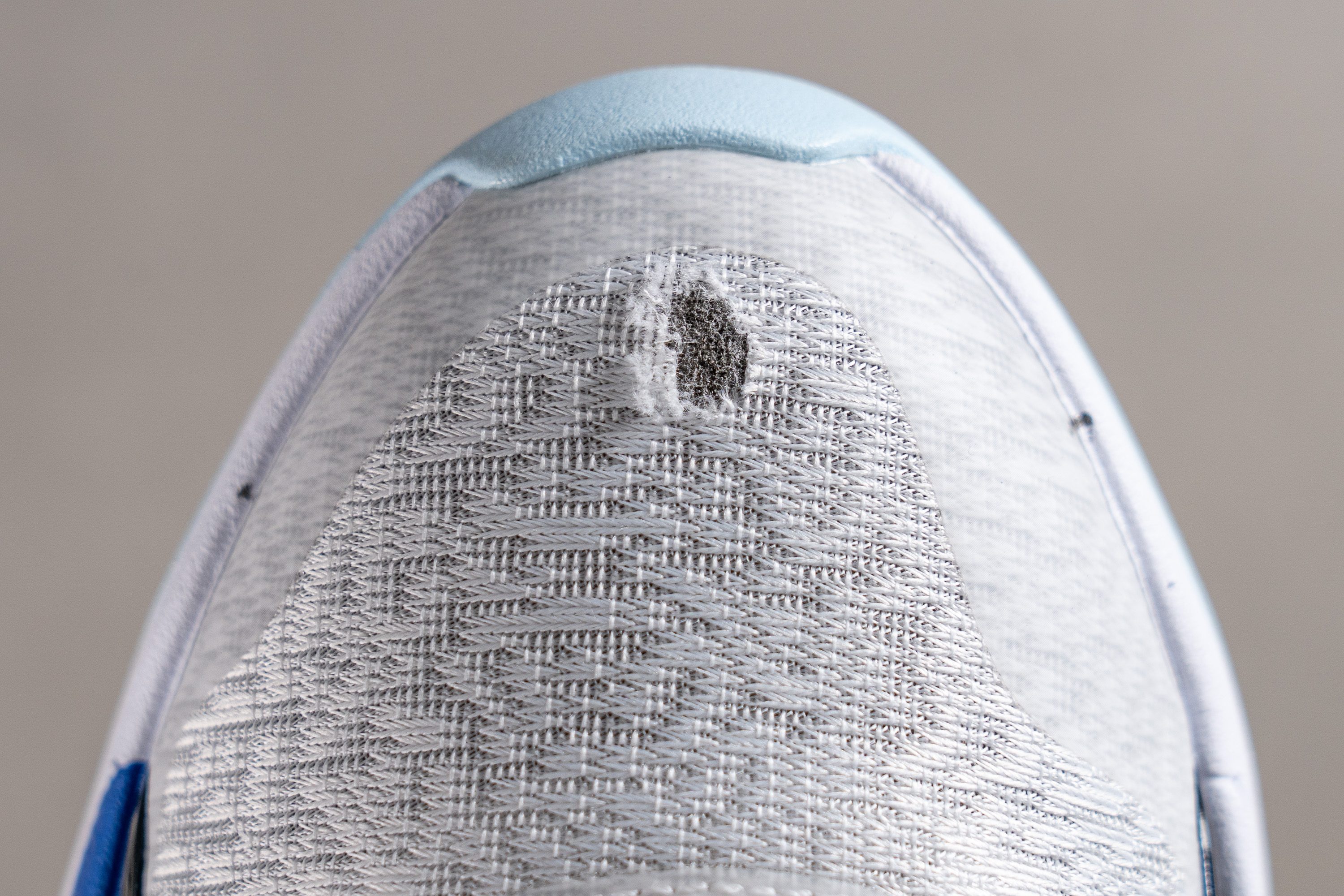
Yet when we removed the tool from the crime scene, the damage wasn't that bad!
We could see the threads were a little bit of a mess up there, but it's not like the Dremel had completely destroyed the material or created a big hole. That's why we decided to give the KD 17 a 3/5 in durability.
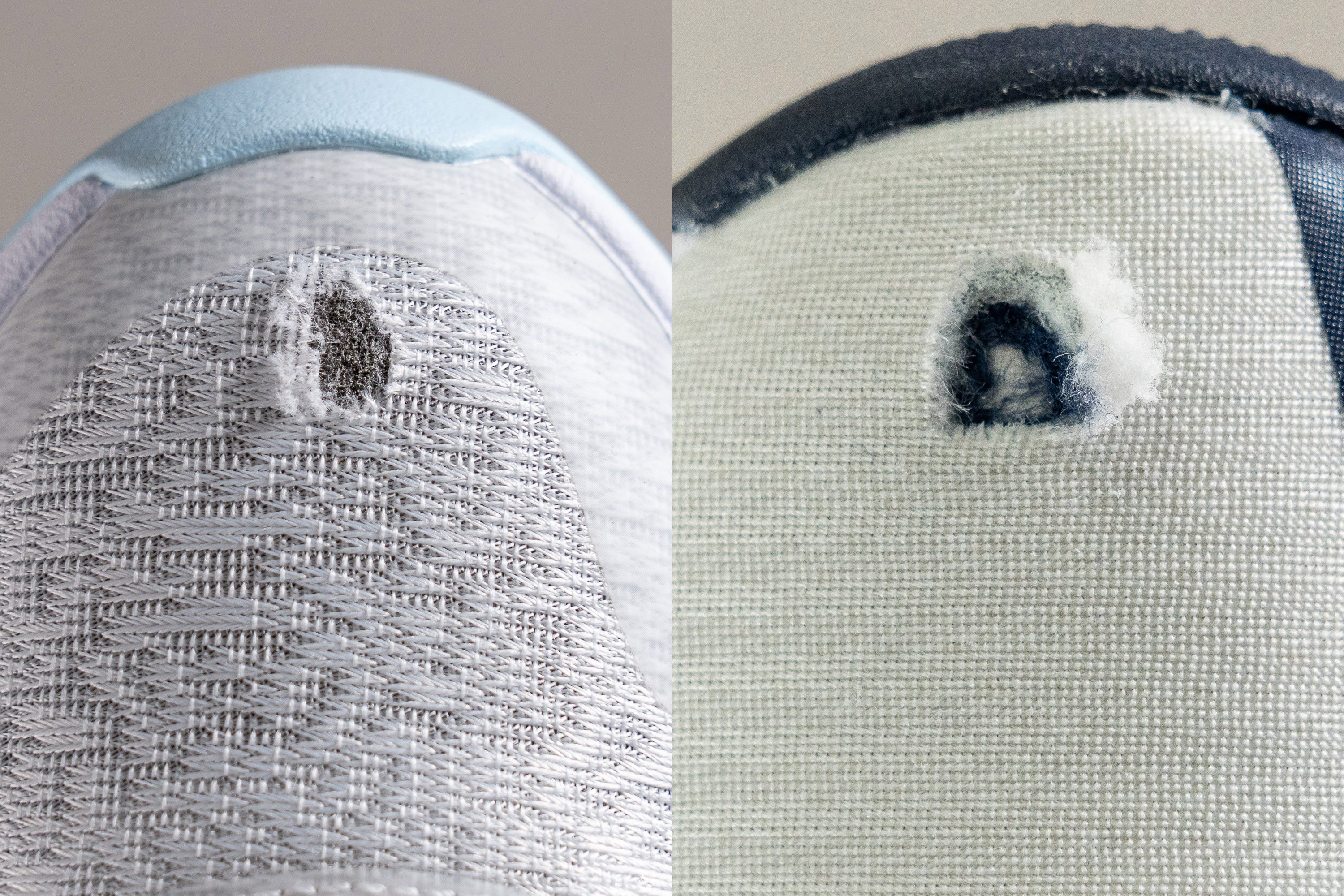
This is what we mean by "the damage wasn't that bad". On the left, the Nike KD 17 after our toebox durability test. On the right, the Nike Precision 6 after this same test. Look at all the broken layers of material, that's what a 1/5 looks like!
| KD 17 | 3 |
| Average | 3.7 |
Heel padding durability
Because of the results on the previous tests, we had our hopes up and expected the KD 17 to keep doing pretty well. Still, we knew that the heel area is the weak point of any shoe. Especially in basketball, with all the jumps, quick cuts, fakes, and post-play.
Once again, we could see some threads flying around during our 4-second test. But we had learned our lesson, so we didn't jump to conclusions until we lifted the tool and checked the damages ourselves.
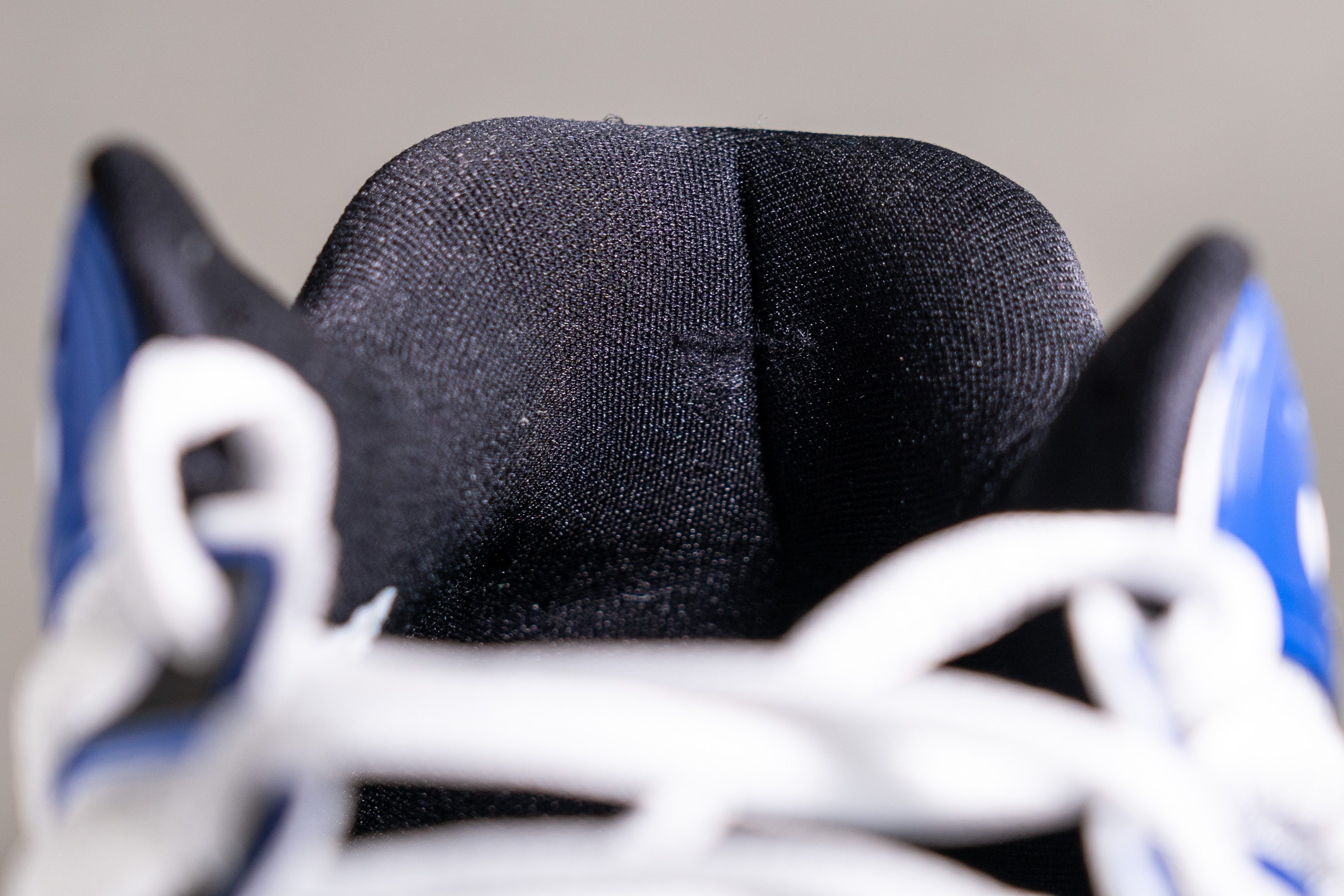
We had to come closer to actually see it. The tool could barely fight the heel padding! This was great news for us, as the KD 17 showed as much resistance to abrasions as the previous iteration, getting a well-deserved 4/5 on our heel padding durability test.
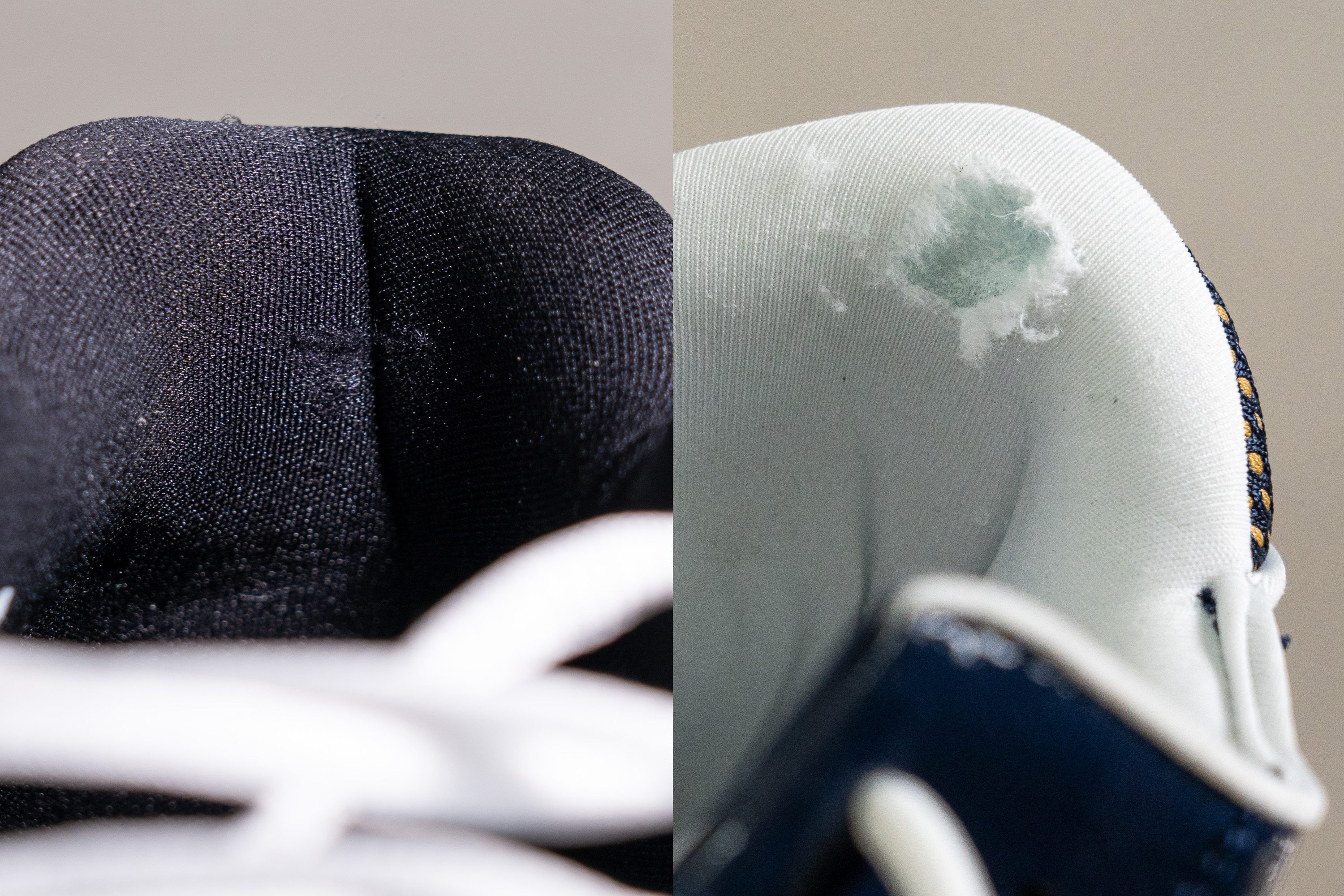
On the right, with the white pulverized material, we've got the Reebok Answer DMX. That's what a 1/5 on this test looks like!
| KD 17 | 4 |
| Average | 3.7 |
Outsole hardness
So far so good, KD 17. But we still have a lot of tests for you, don't worry!
It was time for our outsole hardness test. This time, we grabbed our durometer instead of our Dremel, and turned the shoe upside down. Carefully sticking the tool against the rubber, we saw it returned 87.1 HC.
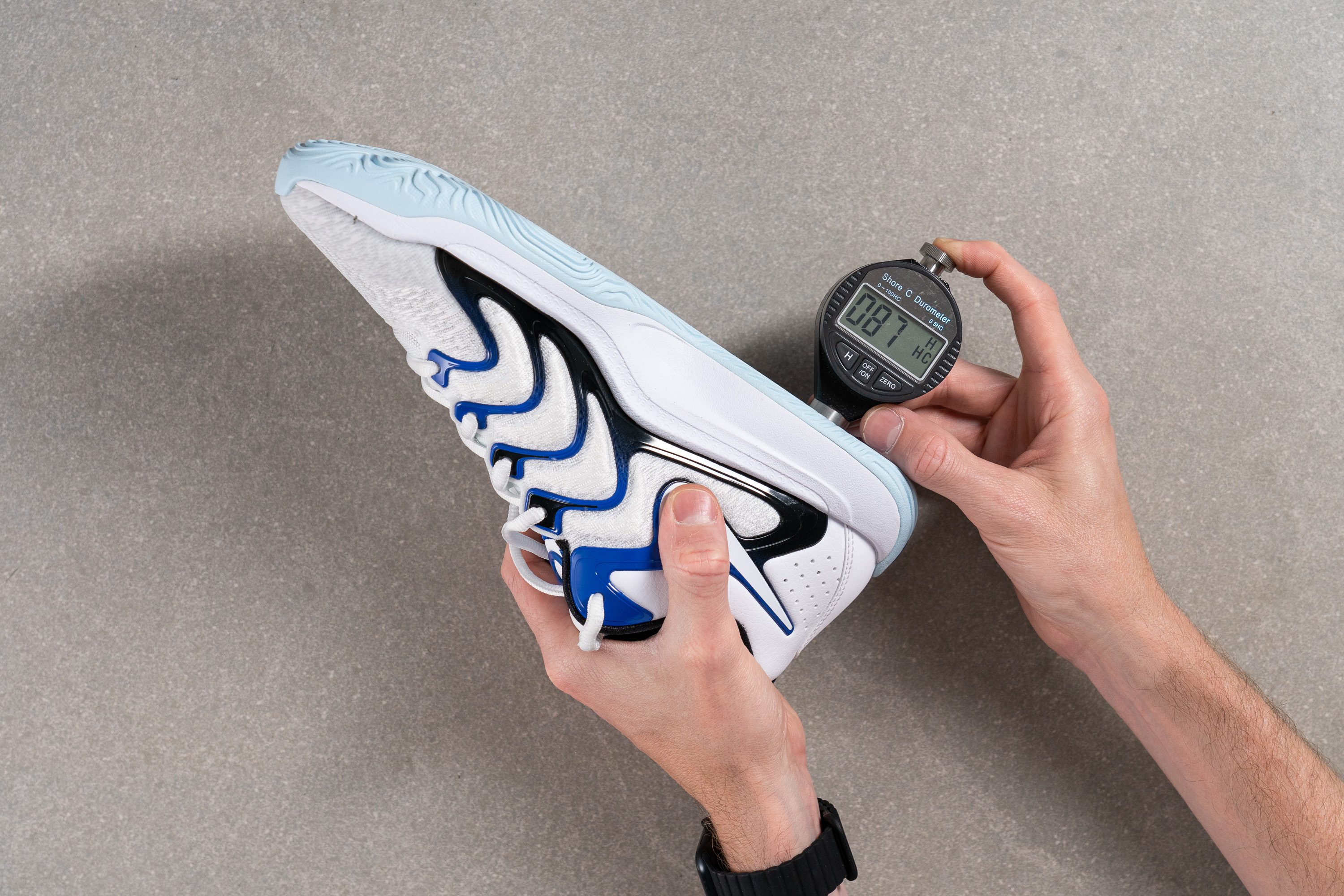
This score is higher than average, which most likely means this shoe's outsole focuses a bit more on durability. In other words, the material should be slightly more long-lasting than average. Nevertheless, the score is not so high for the KD 17 to sacrifice its grip. Let us show you a quick video as proof...
Okay, okay, fine. There's a specific section for that, so no spoilers!
| KD 17 | 87.1 HC |
| Average | 81.5 HC |
Outsole durability
At 0.9 mm, our tread gauge indicated this shoe's outsole is slightly more resistant than average to abrasion.
As you can see, we grabbed our Dremel one last time and went all in for the KD 17's rubber. Despite the increase in speed (from 5K RPM to 10K RPM), the outsole put up a fight and bravely faced the tool.
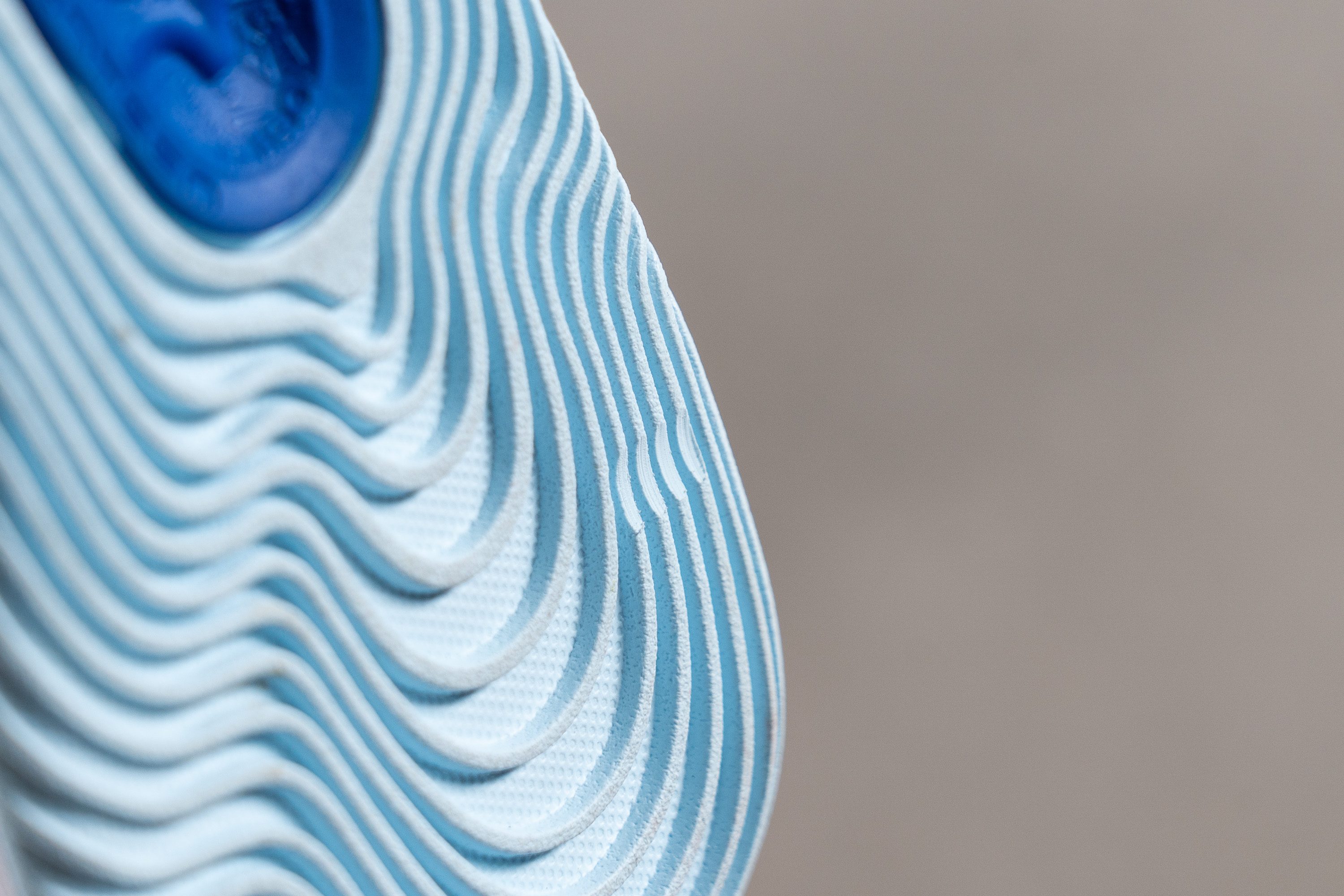
We were pretty happy with the results, as the Dremel didn't manage to completely obliterate the wavy texture of the outsole's pattern.
Nevertheless, we believe it's important to tell you that, if those waves disappear, this Nike will most likely lose its traction. That's why we can't recommend it to play streetball exclusively! You can use it from time to time, sure, it should withstand a couple of games. But a constant or exclusive use outdoors might make you have to change shoes sooner than you'd like.
| KD 17 | 0.9 mm |
| Average | 1.0 mm |
Outsole thickness
To measure the outsole thickness properly, we need to cut the shoe in half. But this is not something that we do only on basketball models, we cut every pair into two! If you want to know more about the way we do things here, in RunRepeat, you should have a look at our testing methodology.
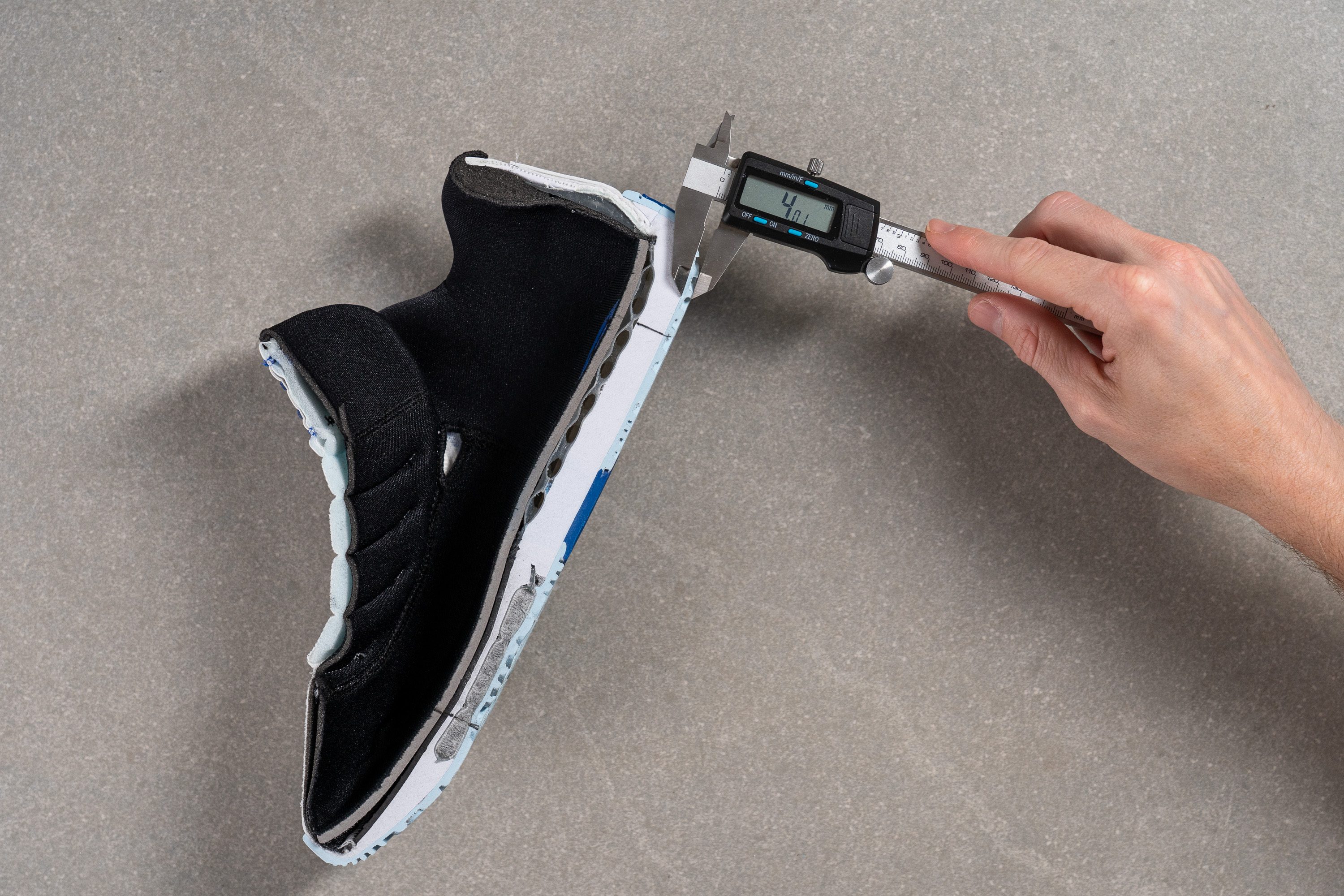
At 4.0 mm, our caliper indicated the Nike KD 17's outsole is just as thick as average. Even though it's slightly harder than average, it's pretty much as durable. Taking all this into account, we believe the KD 16 is a much better option to play streetball.
| KD 17 | 4.0 mm |
| Average | 4.0 mm |
Misc
Insole thickness
Our durometer returned 4.2 mm when we measured this shoe's insole thickness.
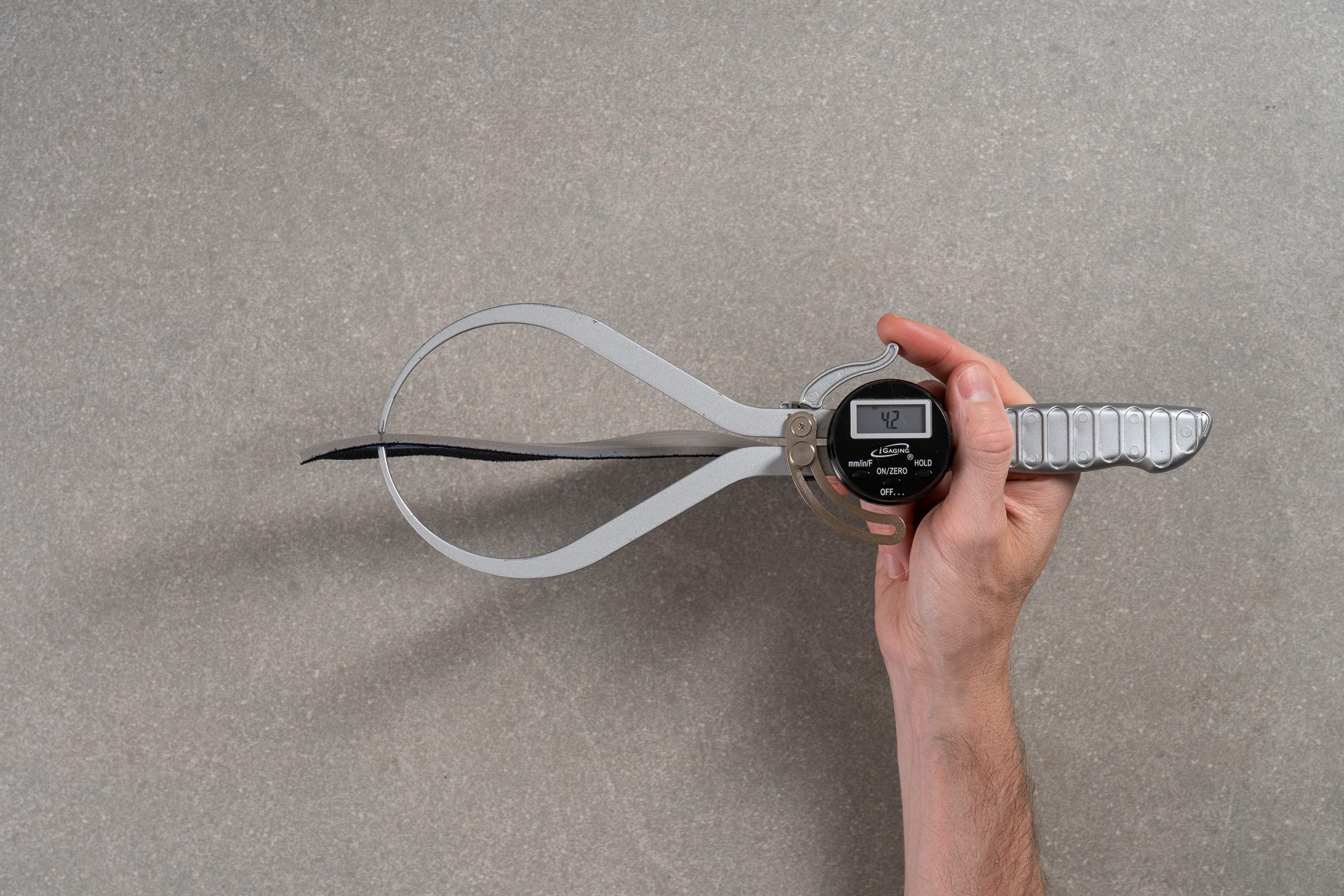
This is pretty much average. We understand the brand's decision, as a more padded insole is not specifically necessary when this Nike is overall on the softer side. In other words, there's no need to add extra weight when we already have what we need from the shoe itself: comfort and stability!
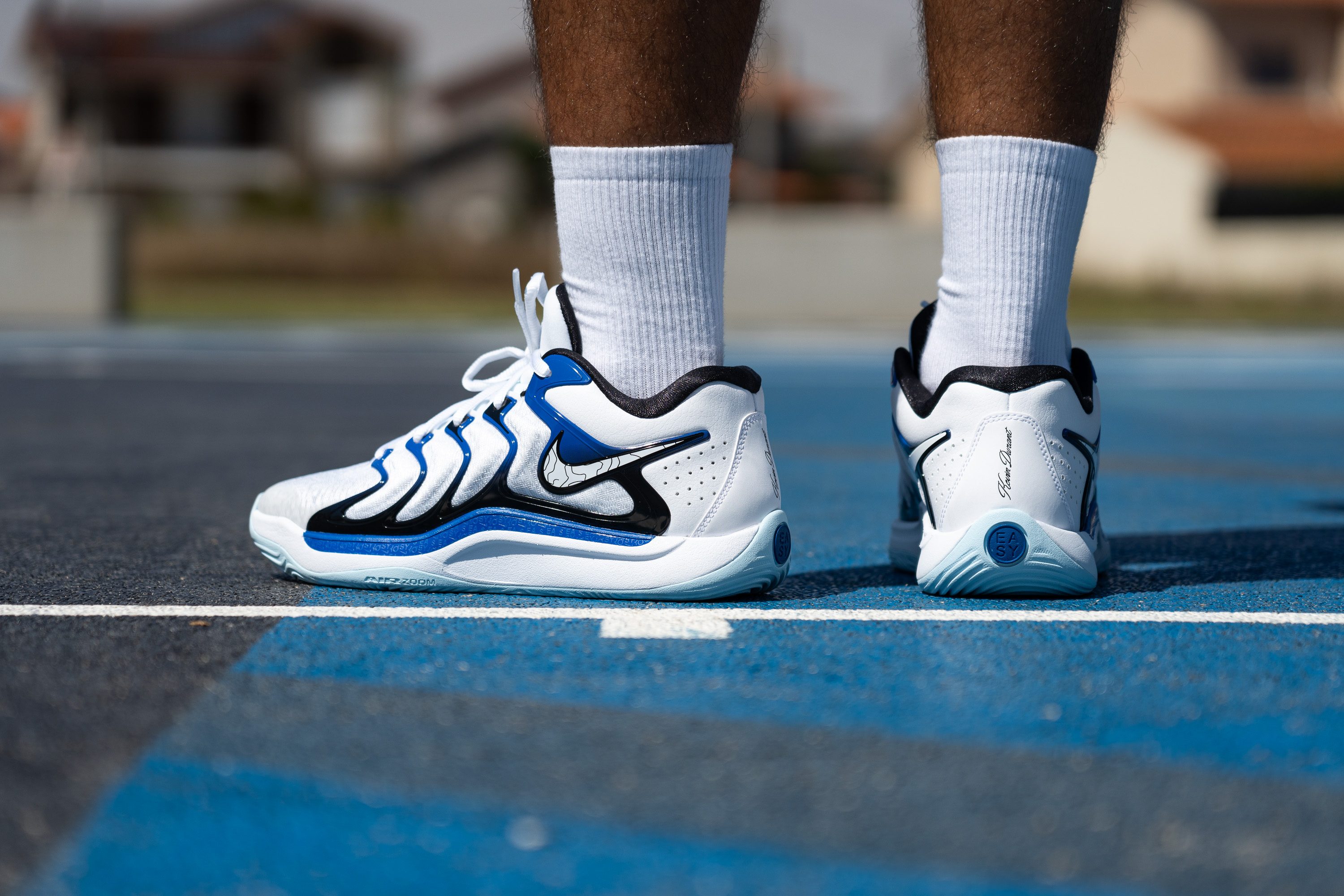
If you're not a fan of "there's nothing special around" insoles, just let us spill the tea for you: this one is removable!
| KD 17 | 4.2 mm |
| Average | 4.9 mm |
Removable insole
We had already hinted at this before, so yeah, the KD 17 has a removable insole!
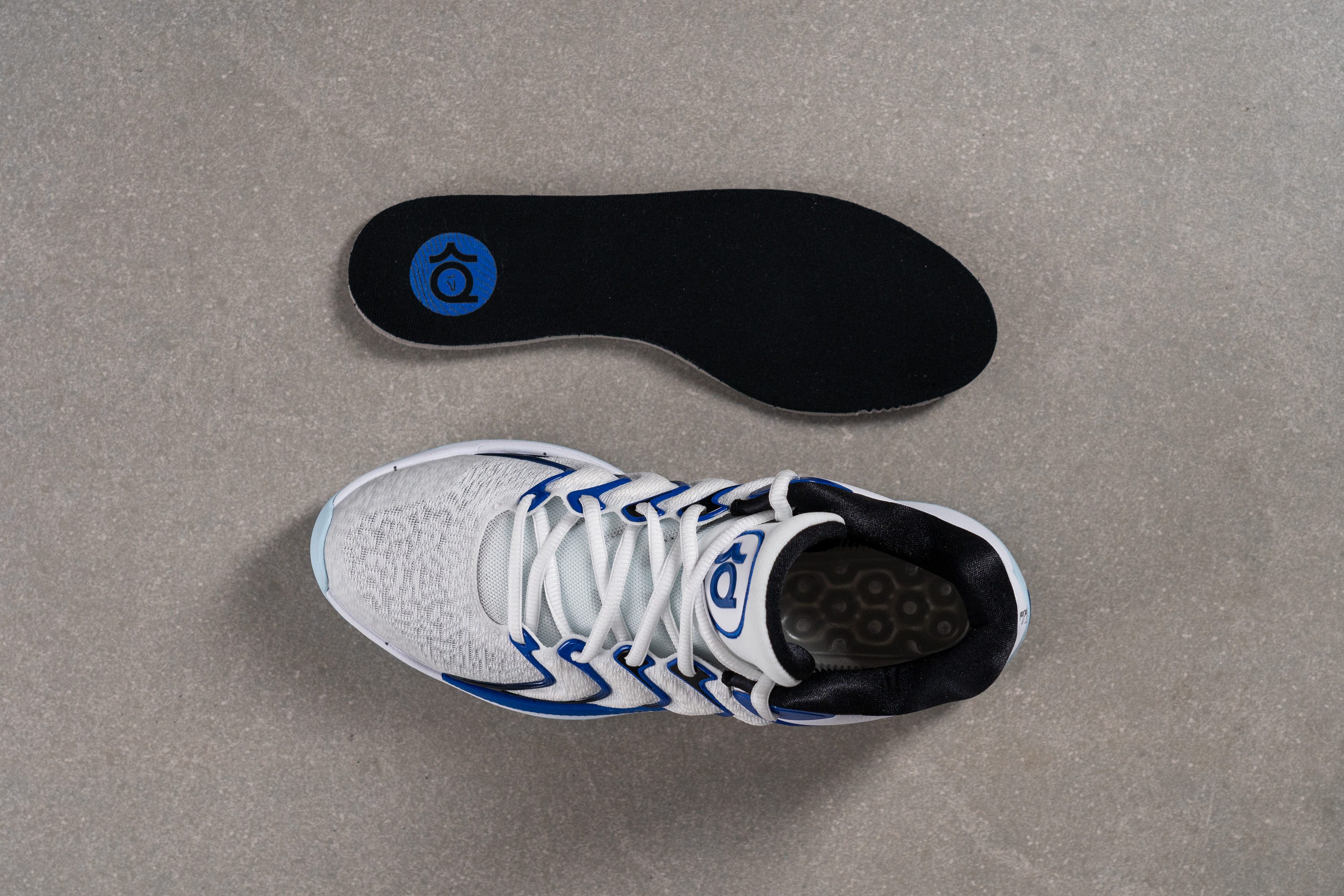
So, if you need to use your own orthotics or you want some extra cushioning or support underfoot, you'll have no problems here. Piece of cake!
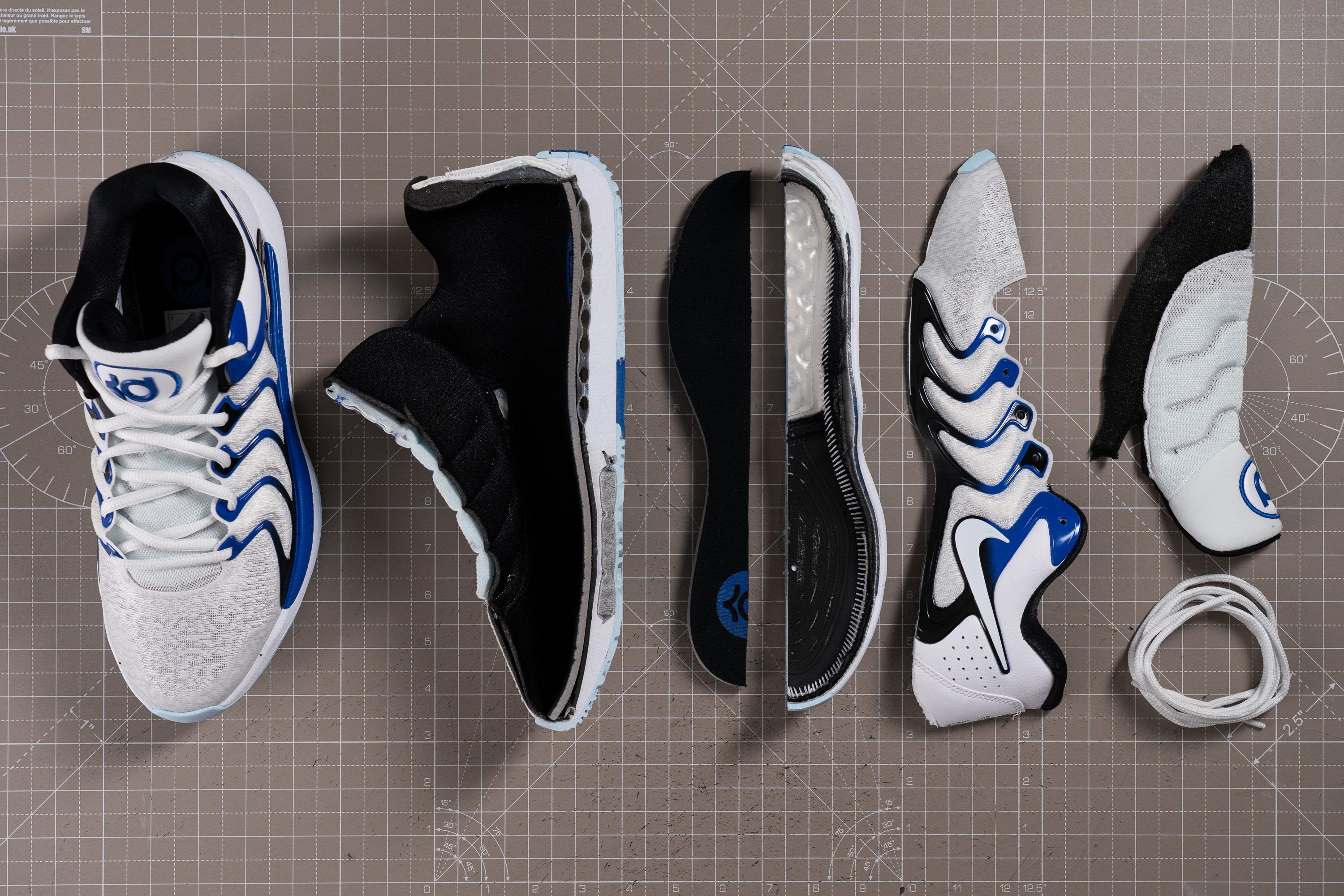
| KD 17 | Yes |
Reflective elements
Oh, wow! We were surprised to see the KD 17 lost the reflective elements in this newest iteration.
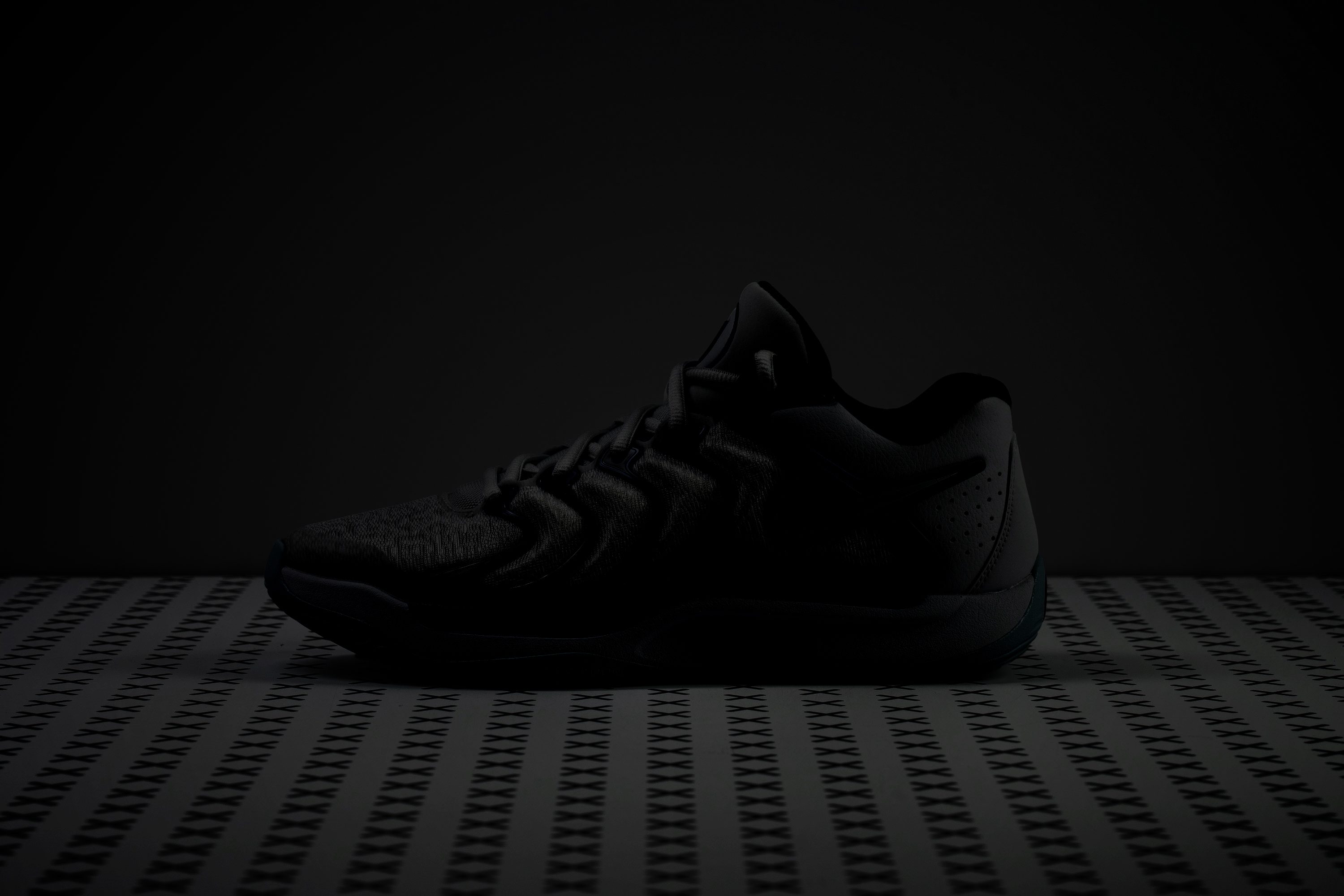
It's true that we believe reflective elements are a nice and expensive touch in shoes, but it's not like we were gonna use them in this Nike specifically. You can use the KD 17 as if it were a pair of sneakers, that's for sure, but if you get it for its main purpose (which is playing some ball), then there will always be light around!
| KD 17 | No |
Tongue padding
When our caliper returned 8.8 mm, we nodded in agreement. Even though it's not quite as much as the average, we really found it to be enough during our playtests. Let us explain why!
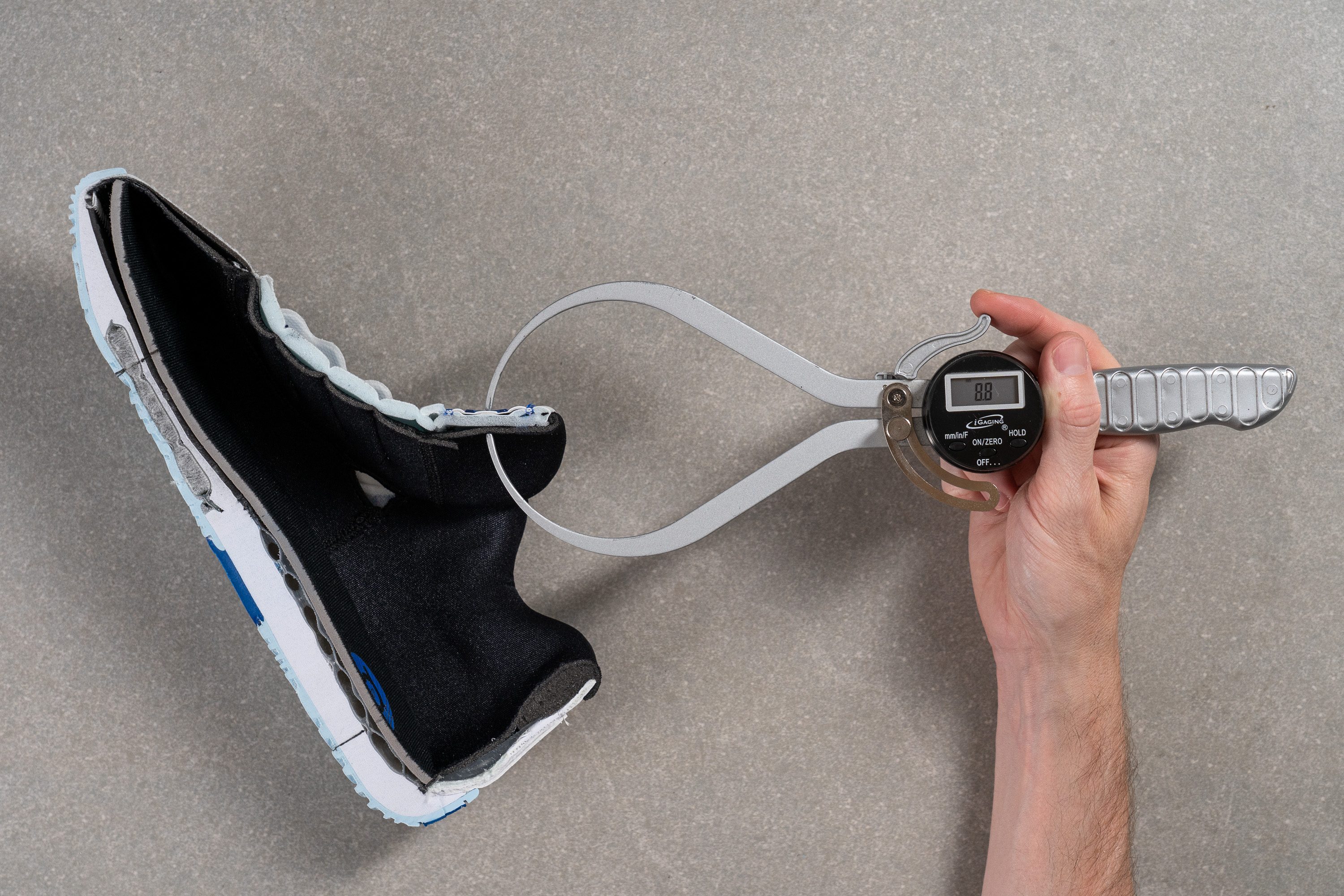
First, less padding means less weight, and we love that! Second, this model features an overall padded structure and a stable design, apart from a gusseted tongue; in other words, the brand didn't need to go overboard with the tongue's padding. Third, the padding is strategically divided, saving weight and focusing on the key areas to avoid lace bite or any kind of uncomfortable rubbing.
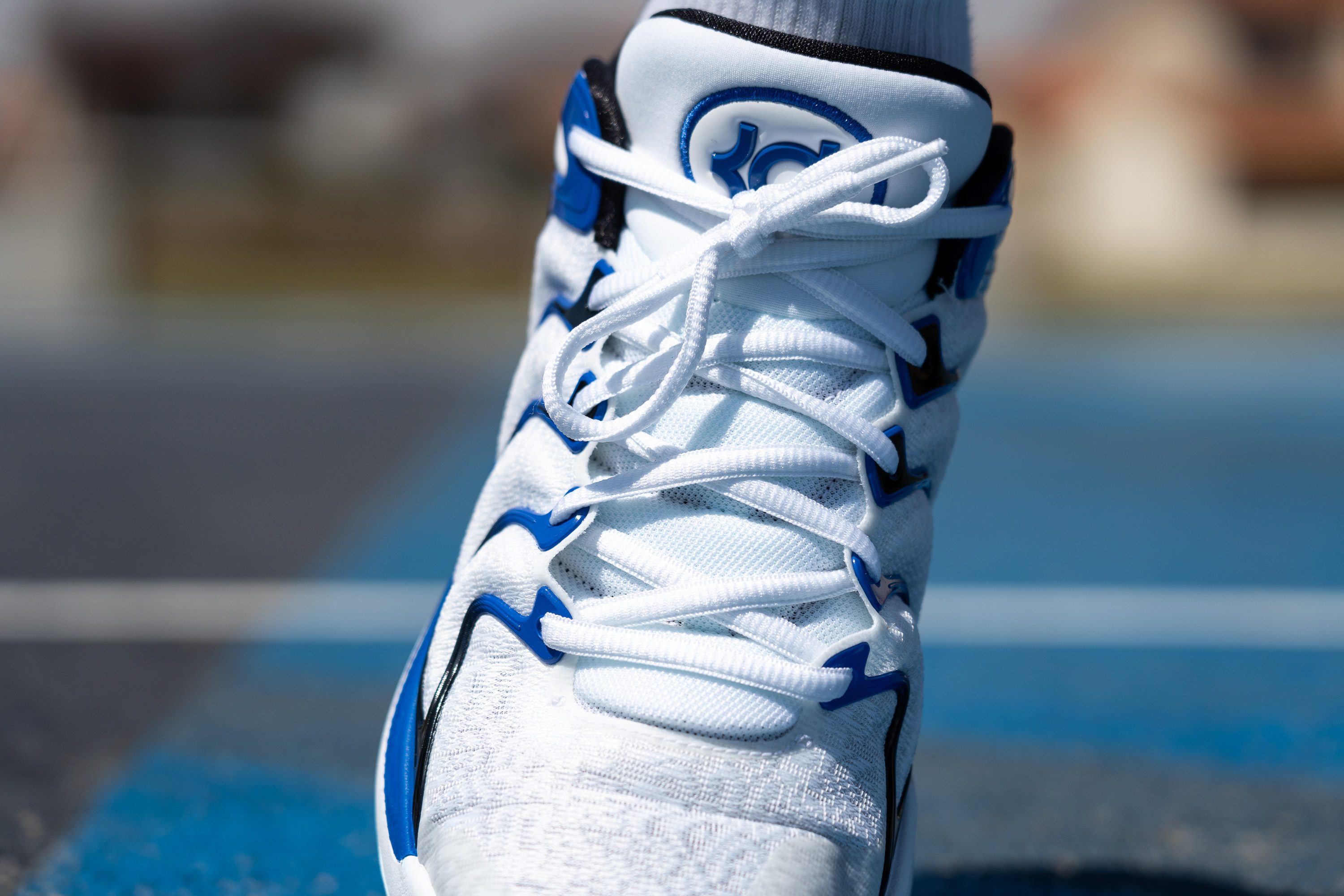
| KD 17 | 8.8 mm |
| Average | 9.3 mm |
Tongue: gusset type
The fully gusseted tongue of the KD 17 added some extra support and foot containment, which are two features that we really, really love.
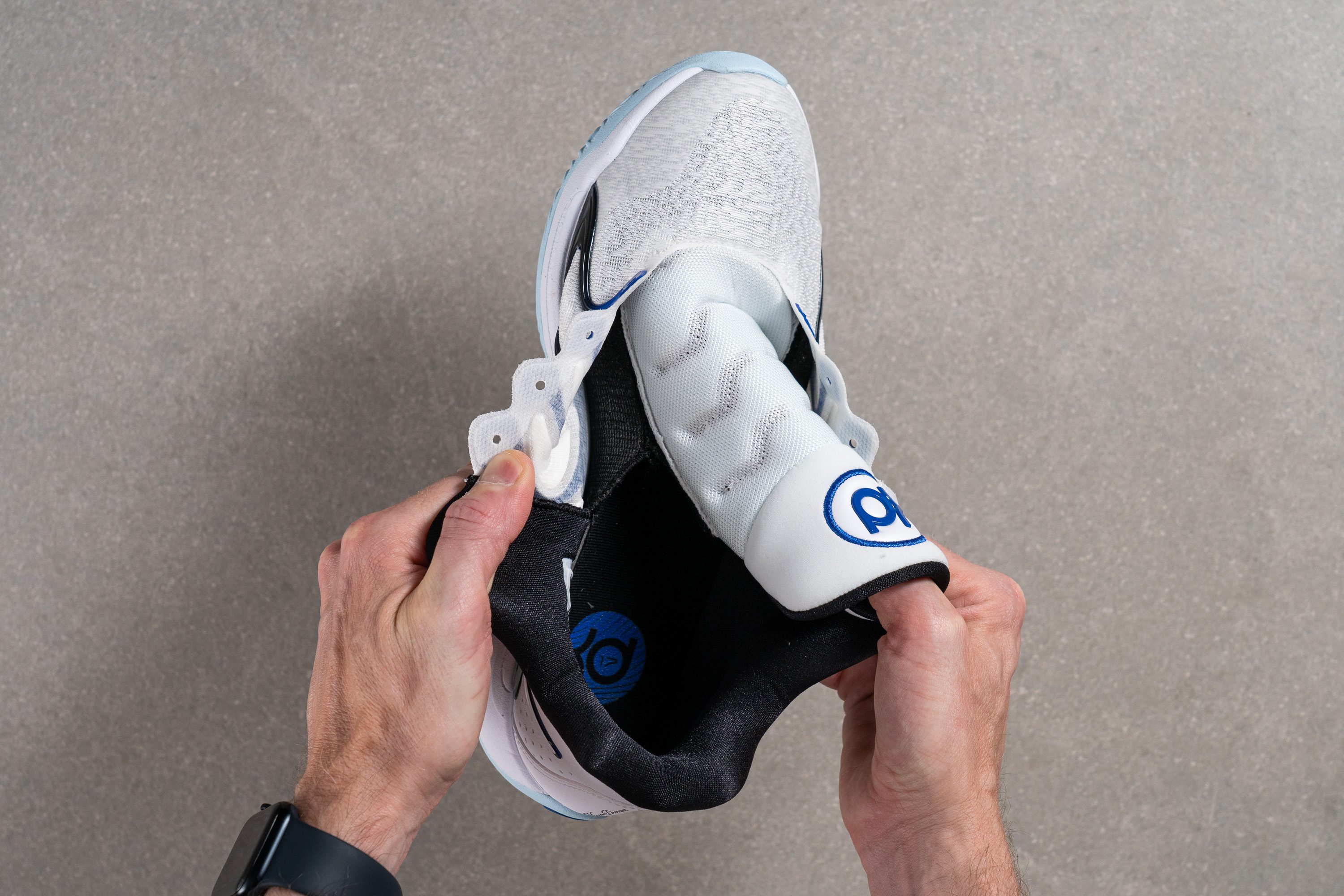
At the same time, we felt relieved when we saw this supportive structure. If you want to know why, just have a look at this shoe's collar. It's pretty big, isn't it? Despite being well-structured and fairly padded, we felt safer knowing the tongue was also doing its best to keep our feet right where they should be.
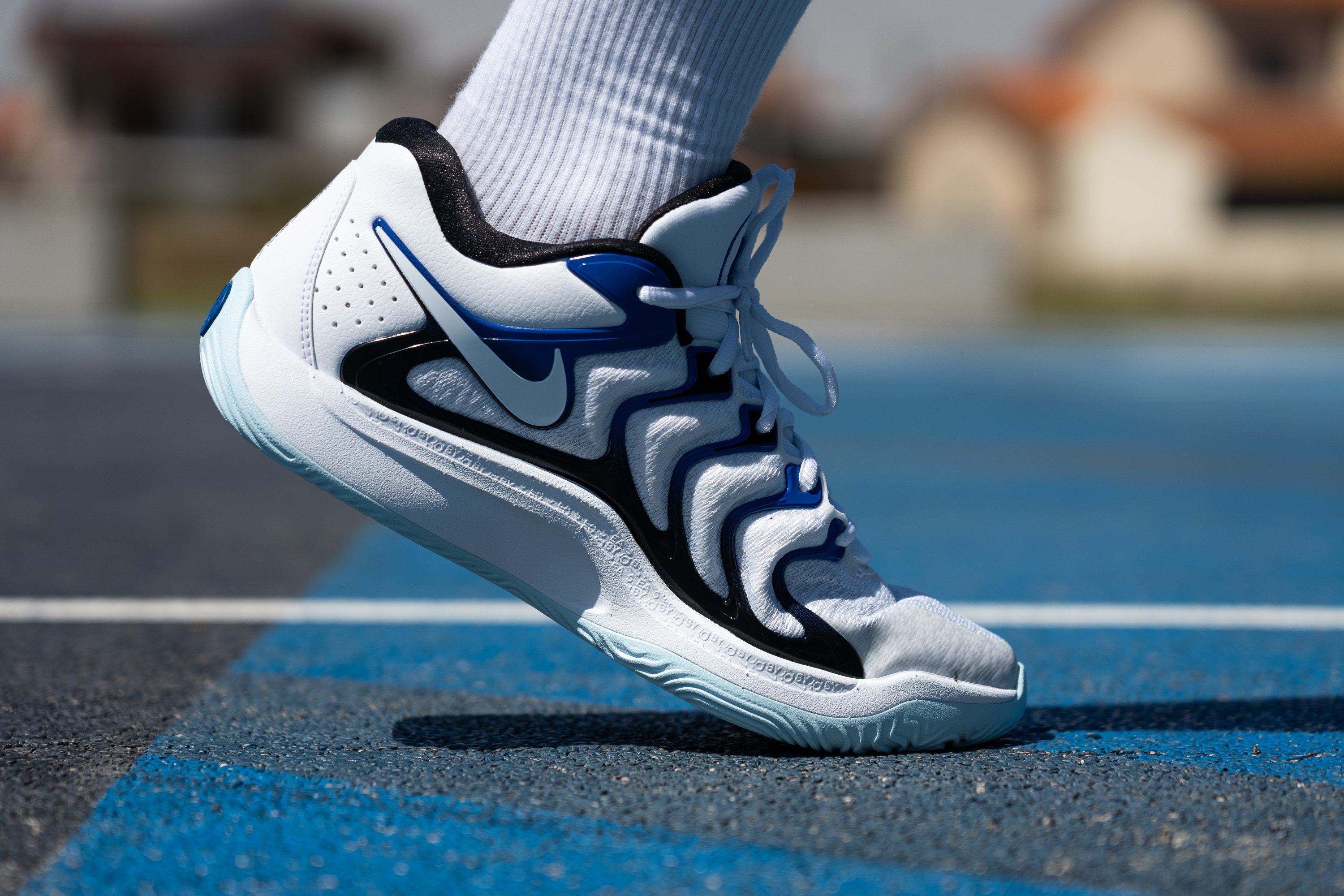
We believe this could also be solved with an extra top eyelet. But ah well, maybe for the KD 18!
| KD 17 | Both sides (full) |
Heel tab
No heel tab around! But it's not like we missed it anyway, to be honest.
We loved the fact that the brand added the player's name right at the back. It's a super stylish detail that substituted the heel tab. But as the KD 17's opening is pretty wide already, we didn't feel it was hard to put it on, even without any kind of pull tab!
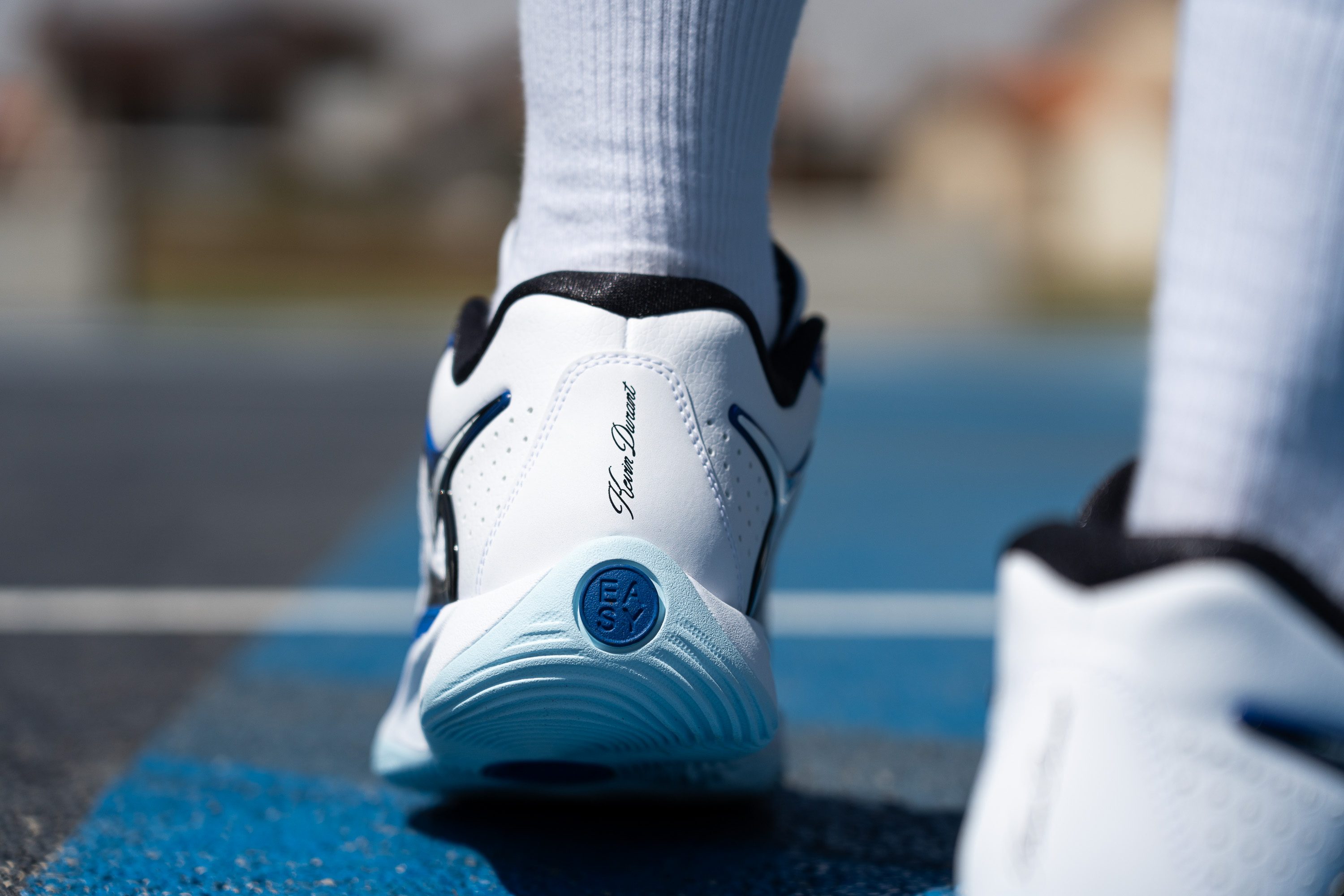
The KDs just keep getting cooler and cooler, we already can't wait for the 18th version!
| KD 17 | None |

